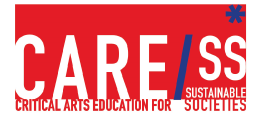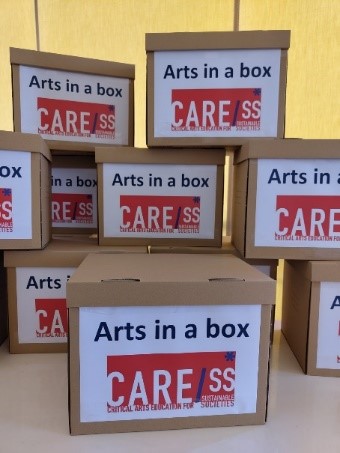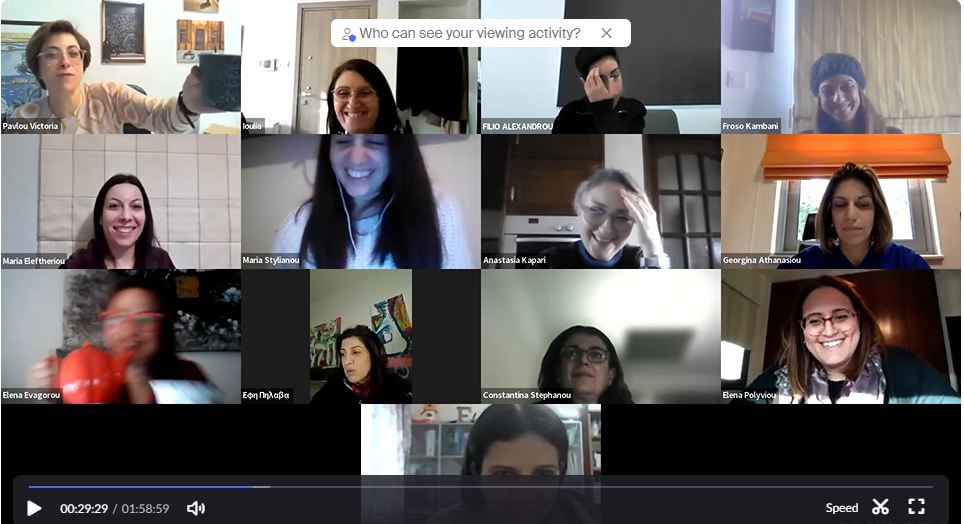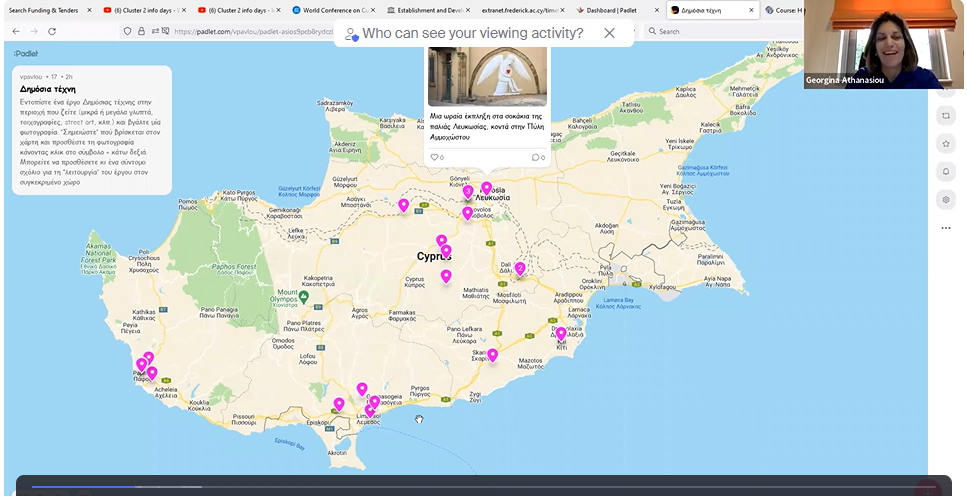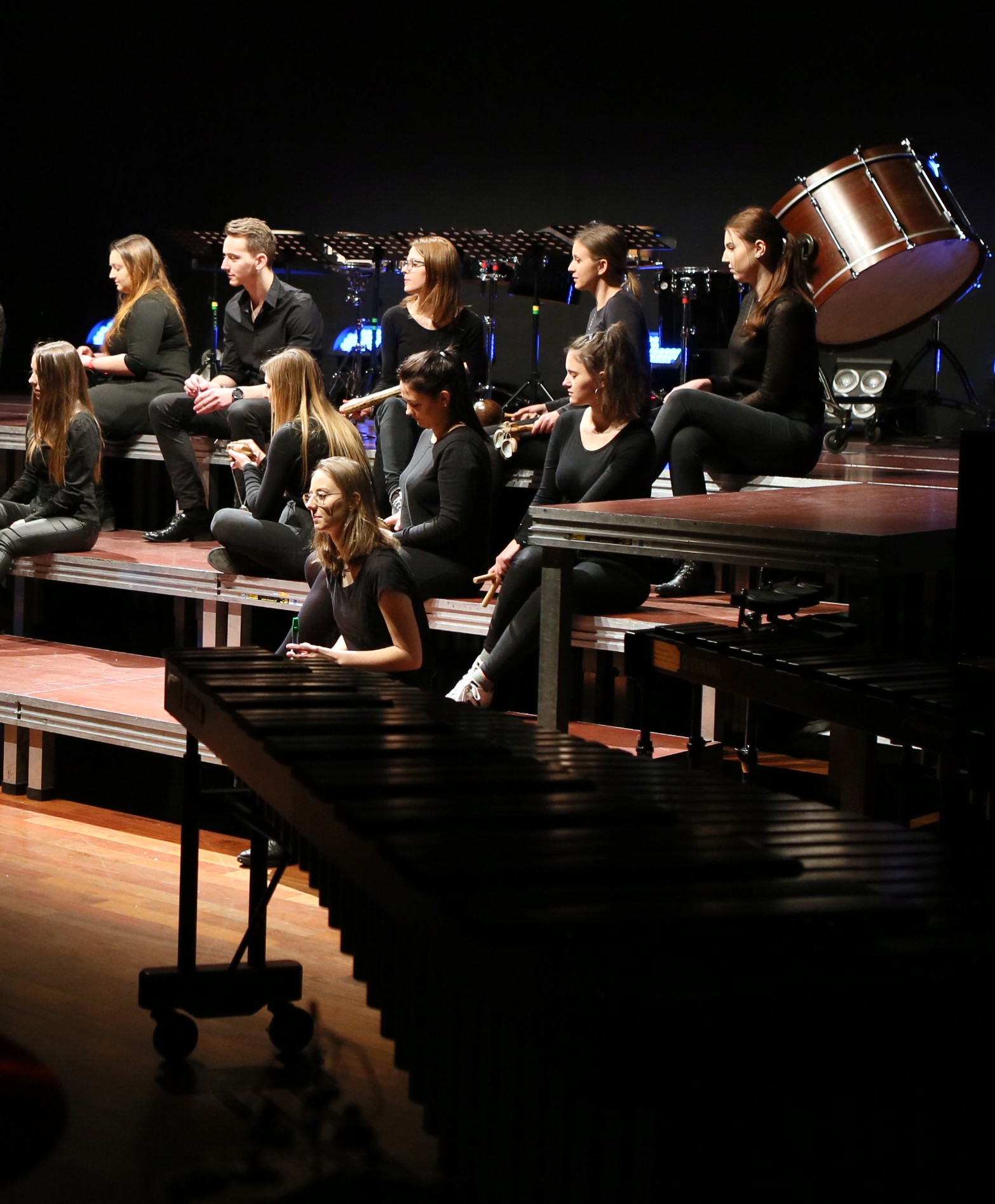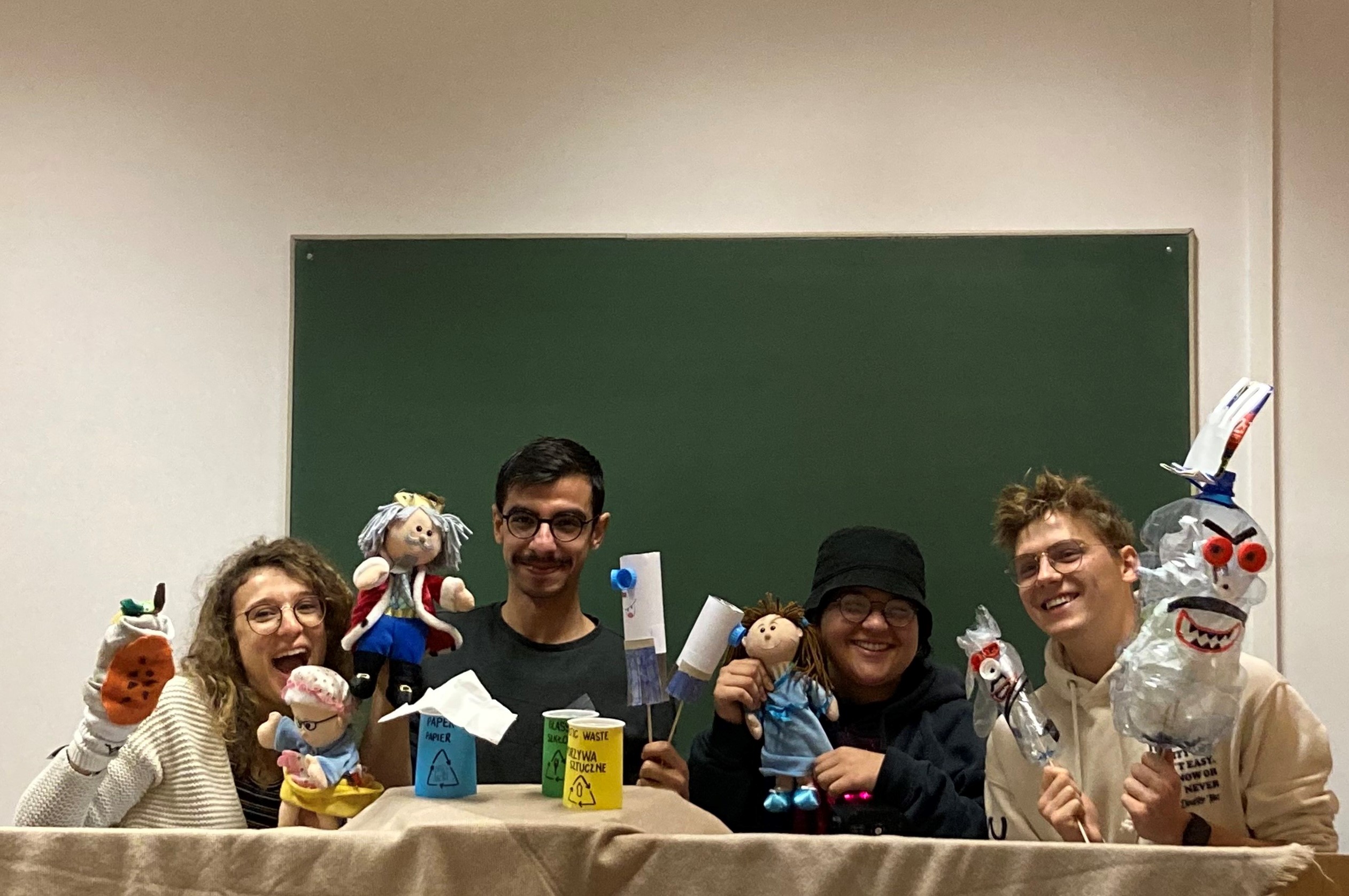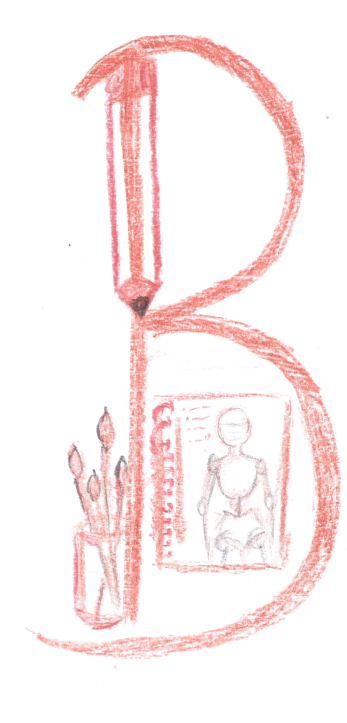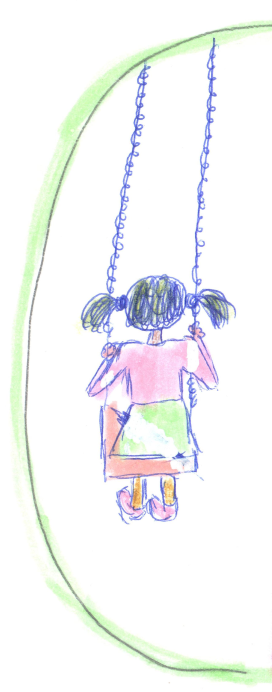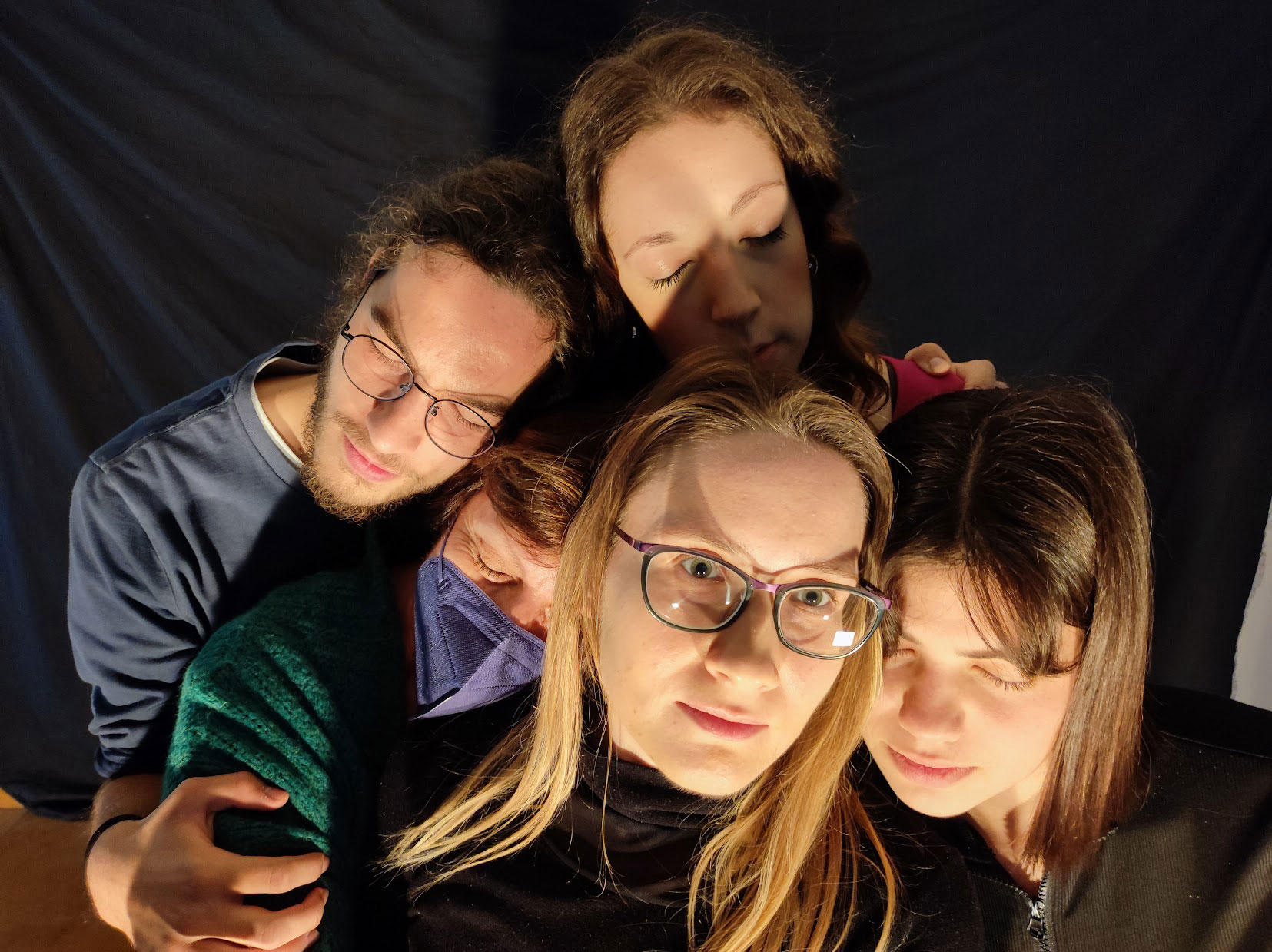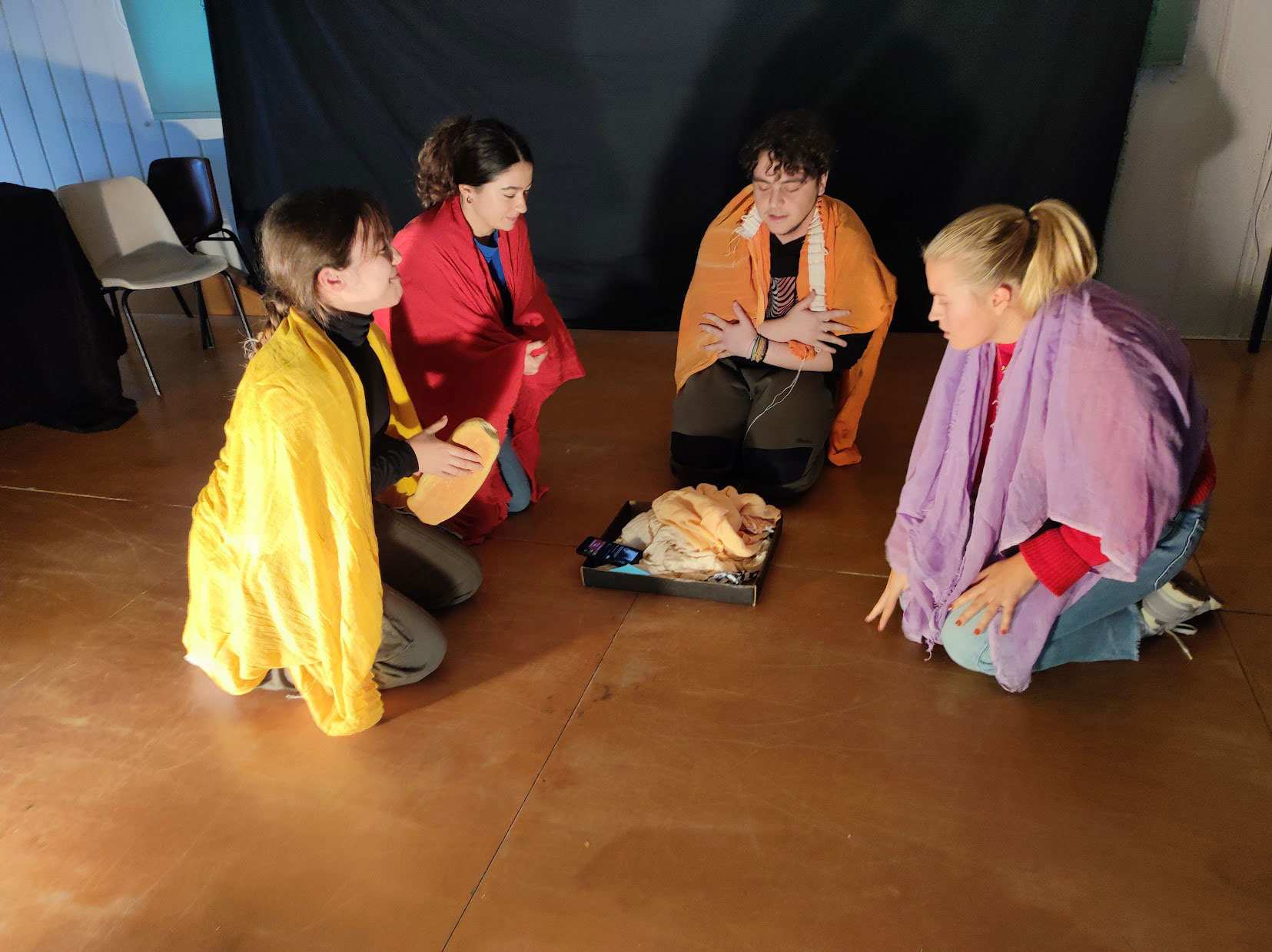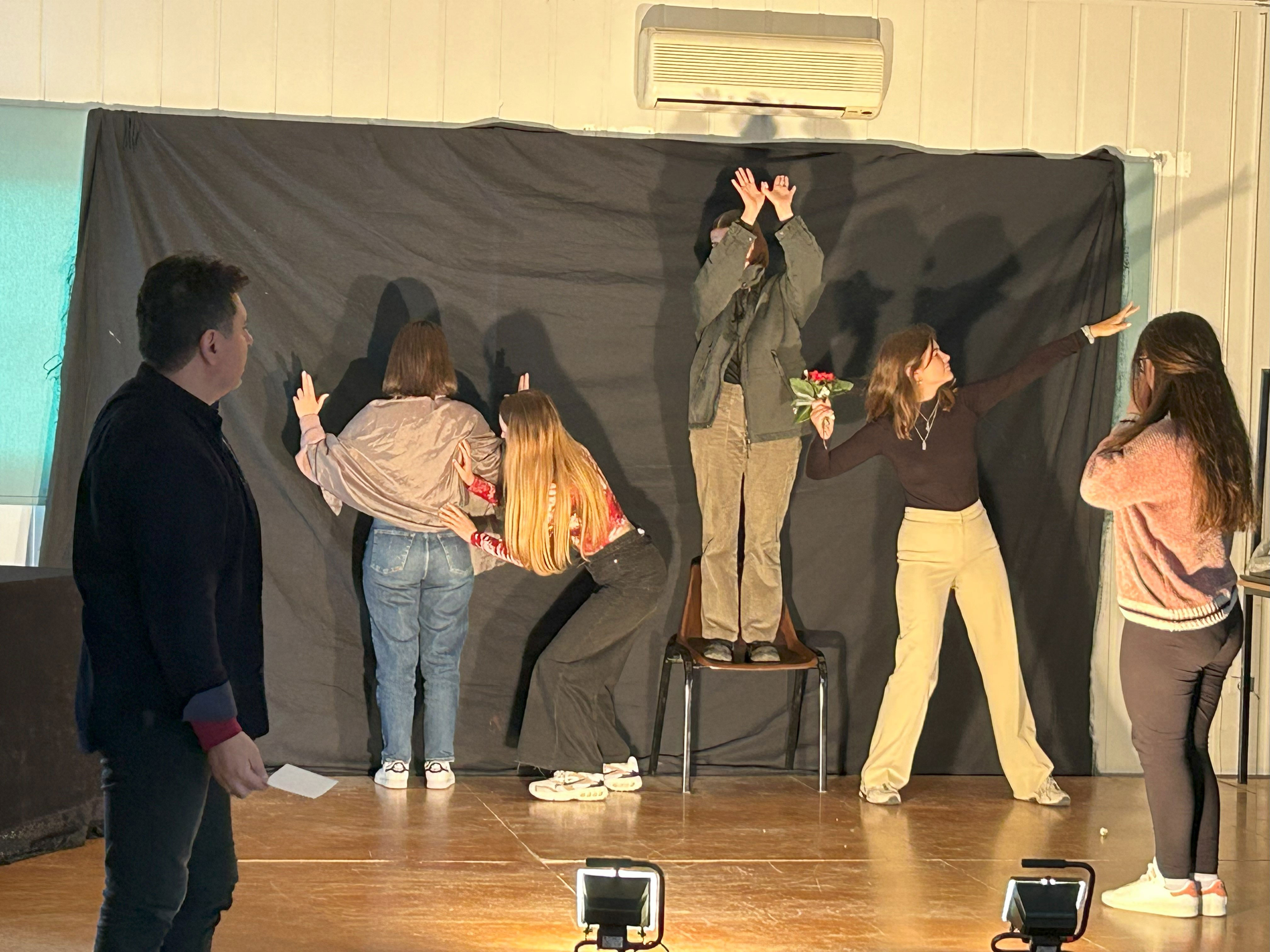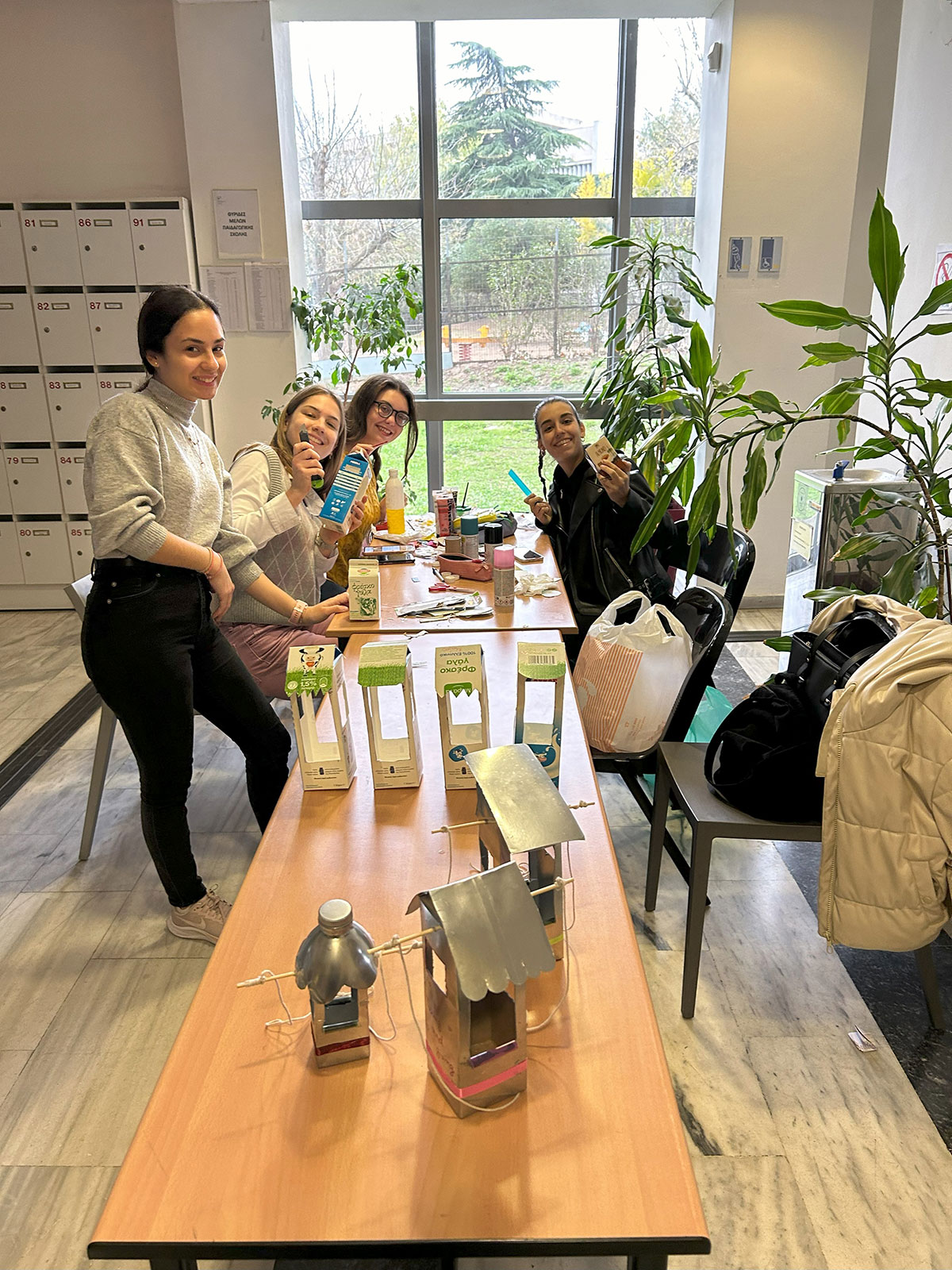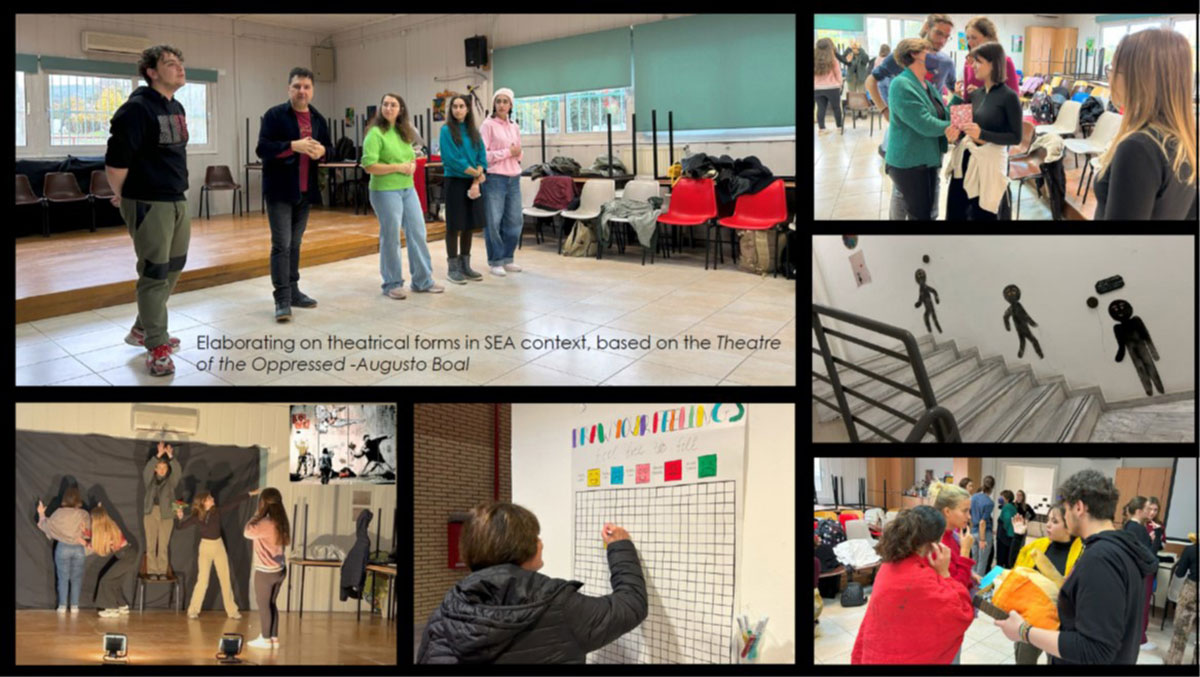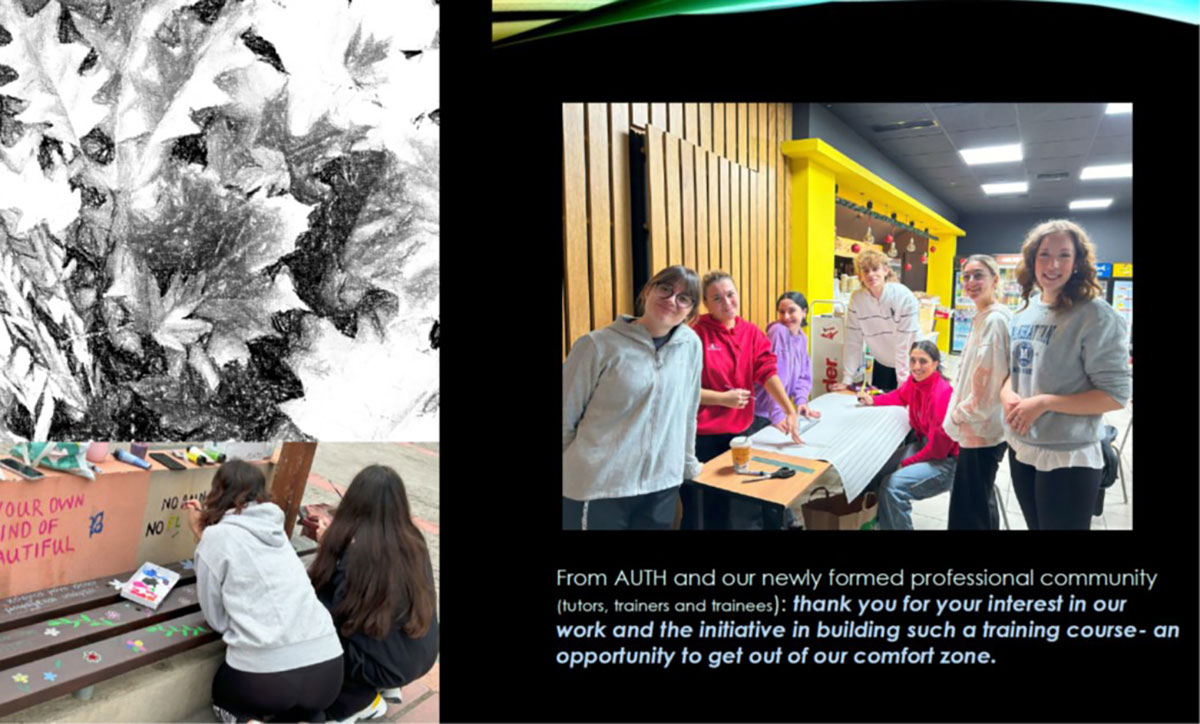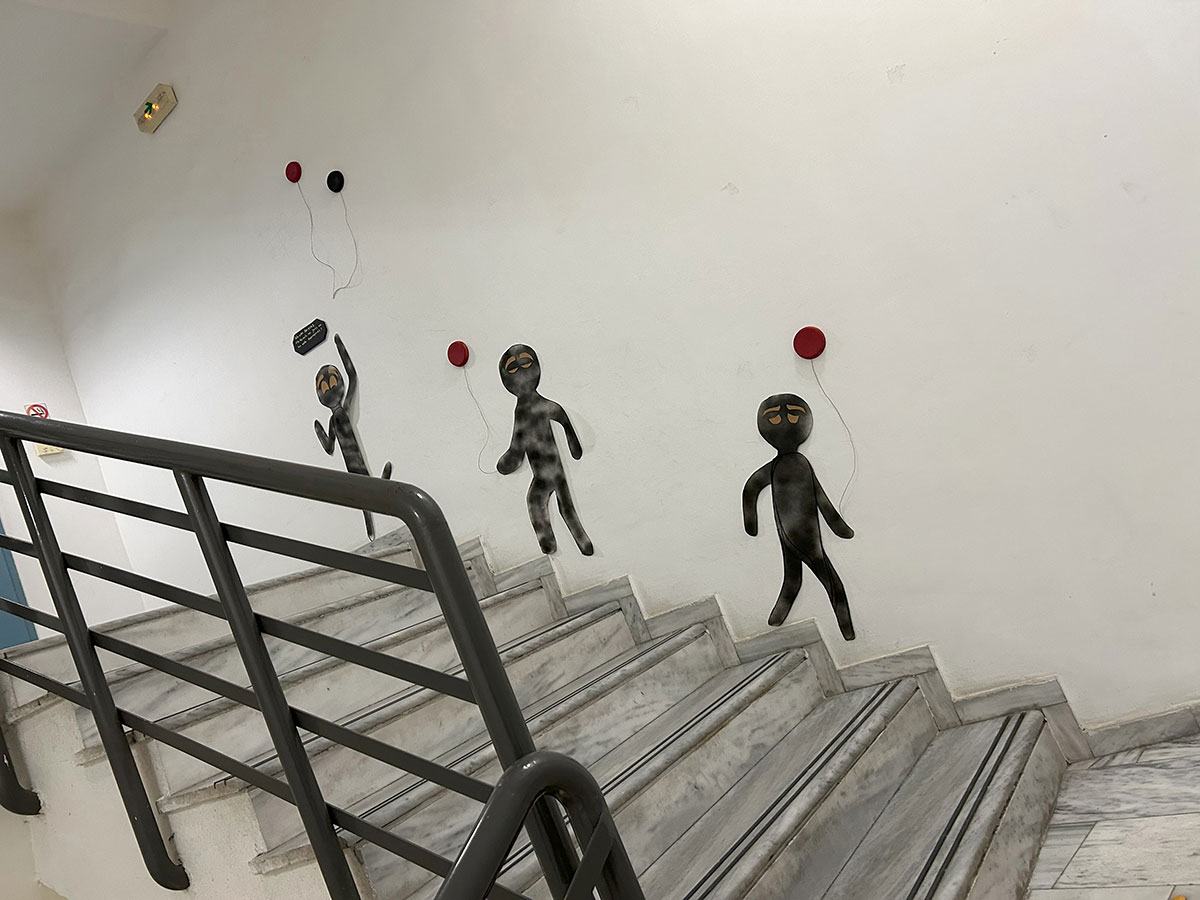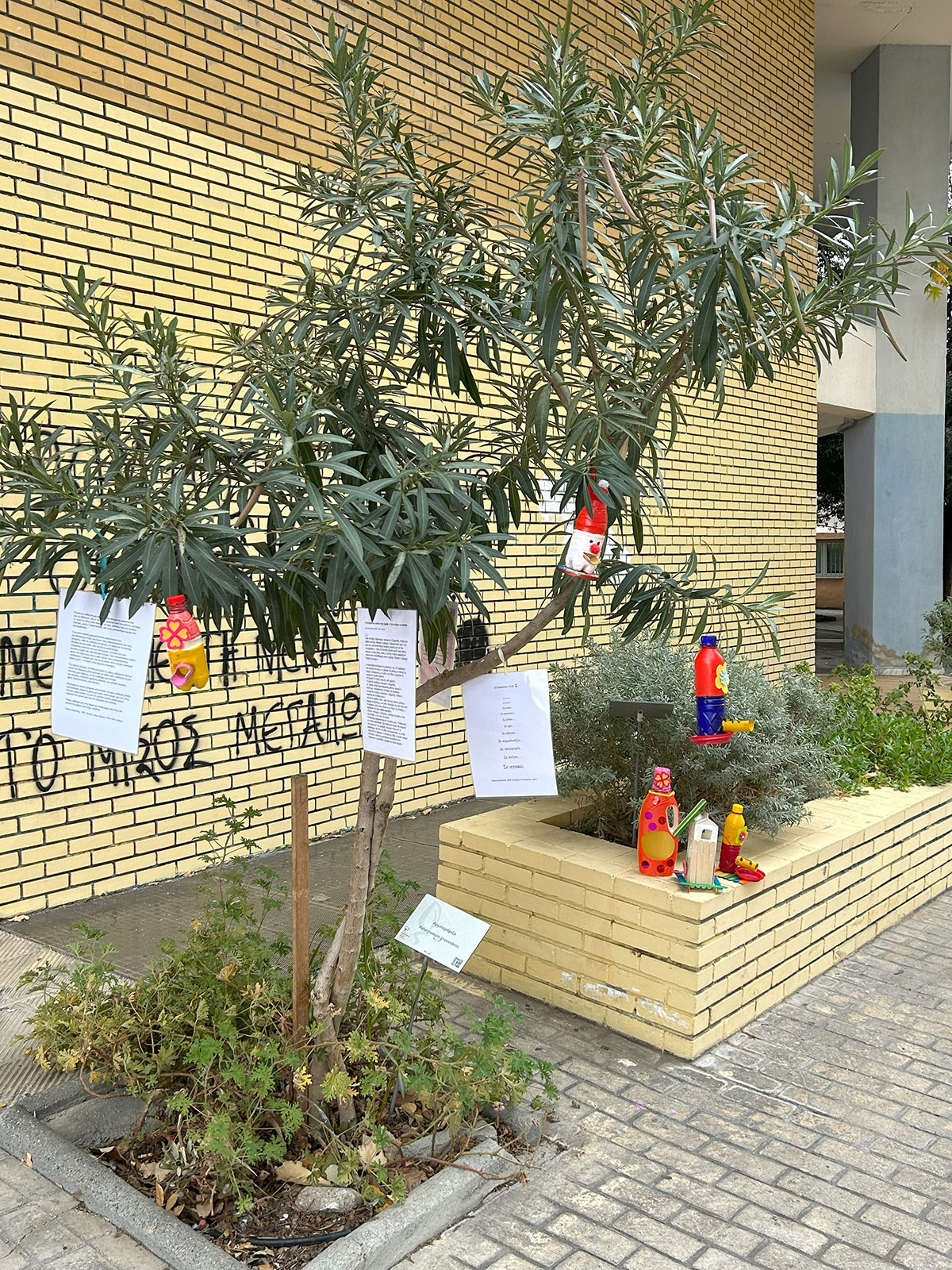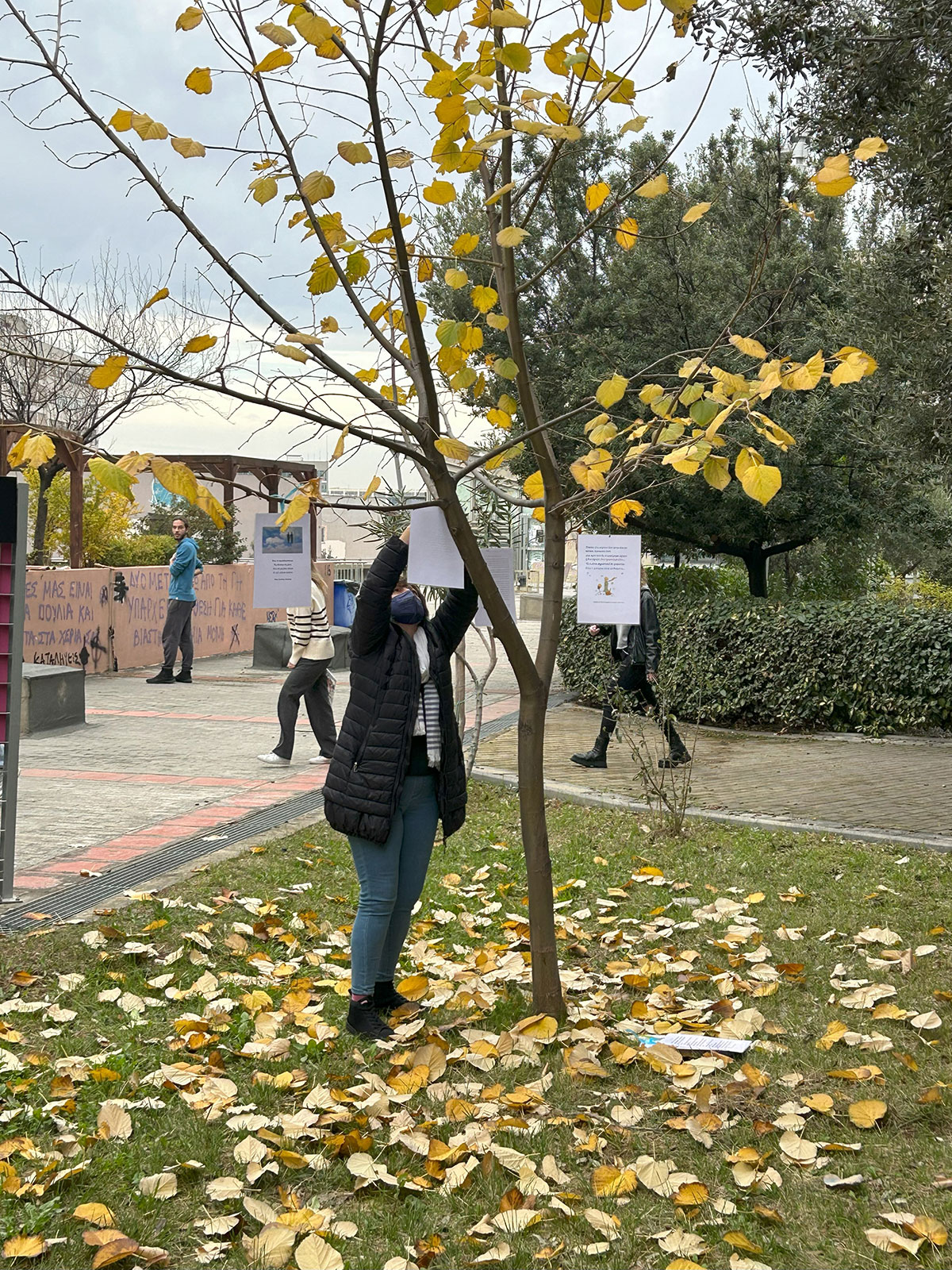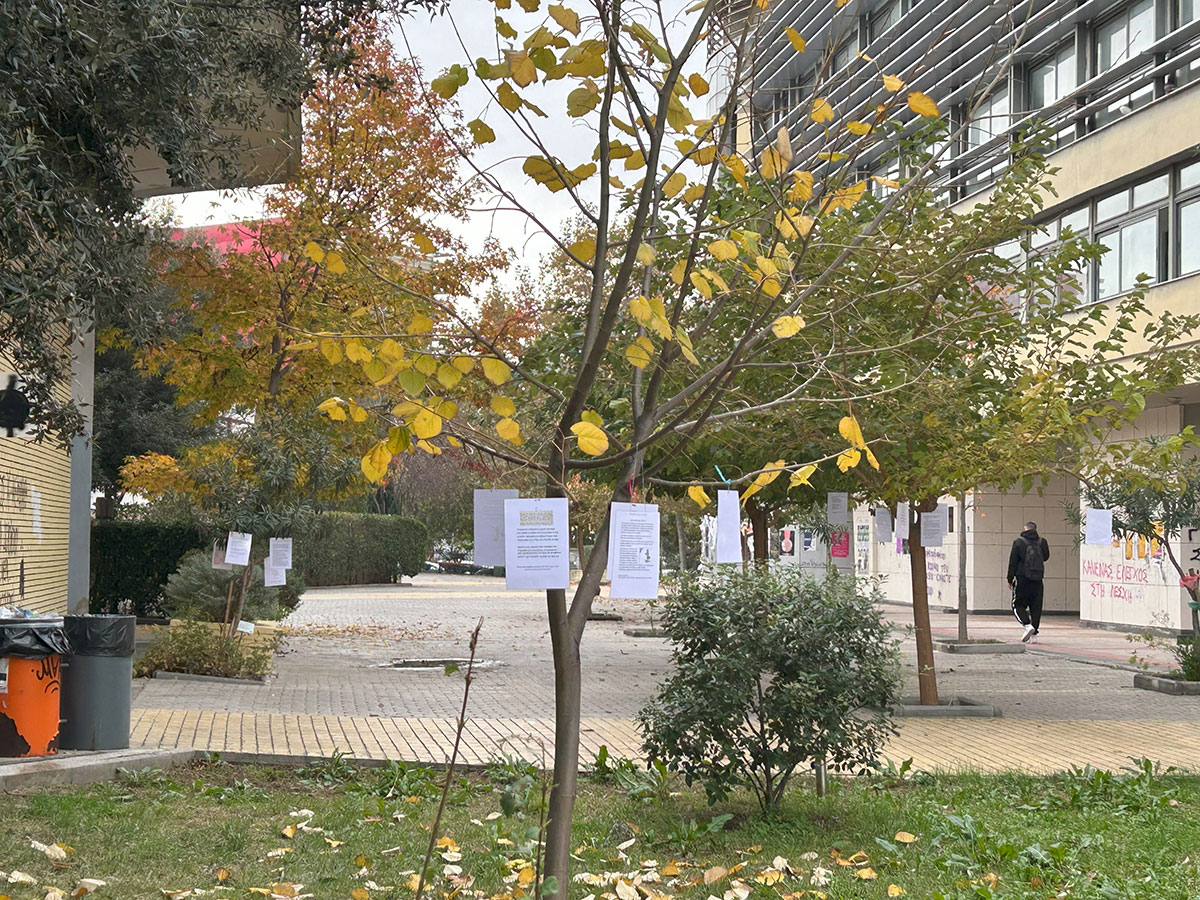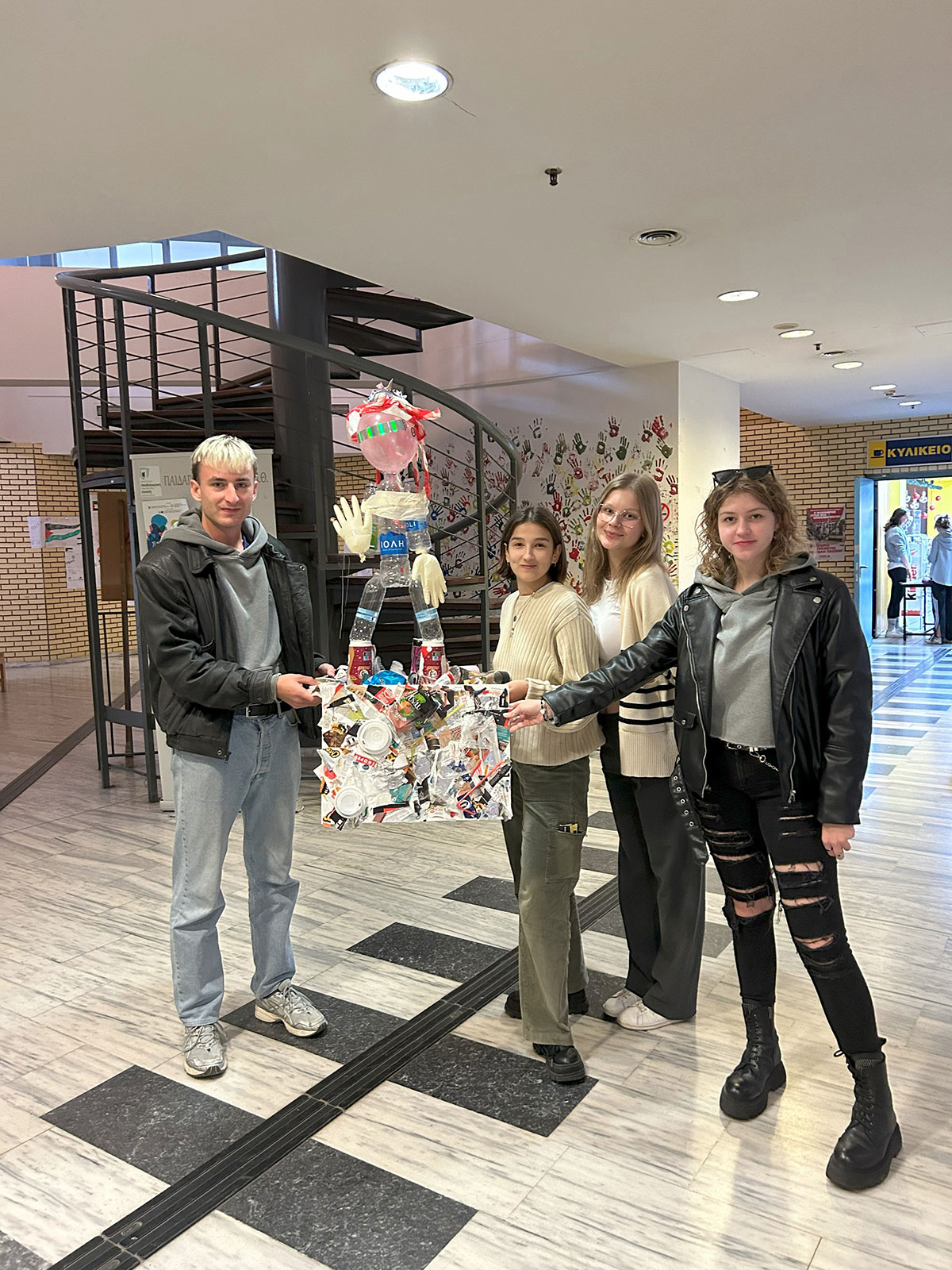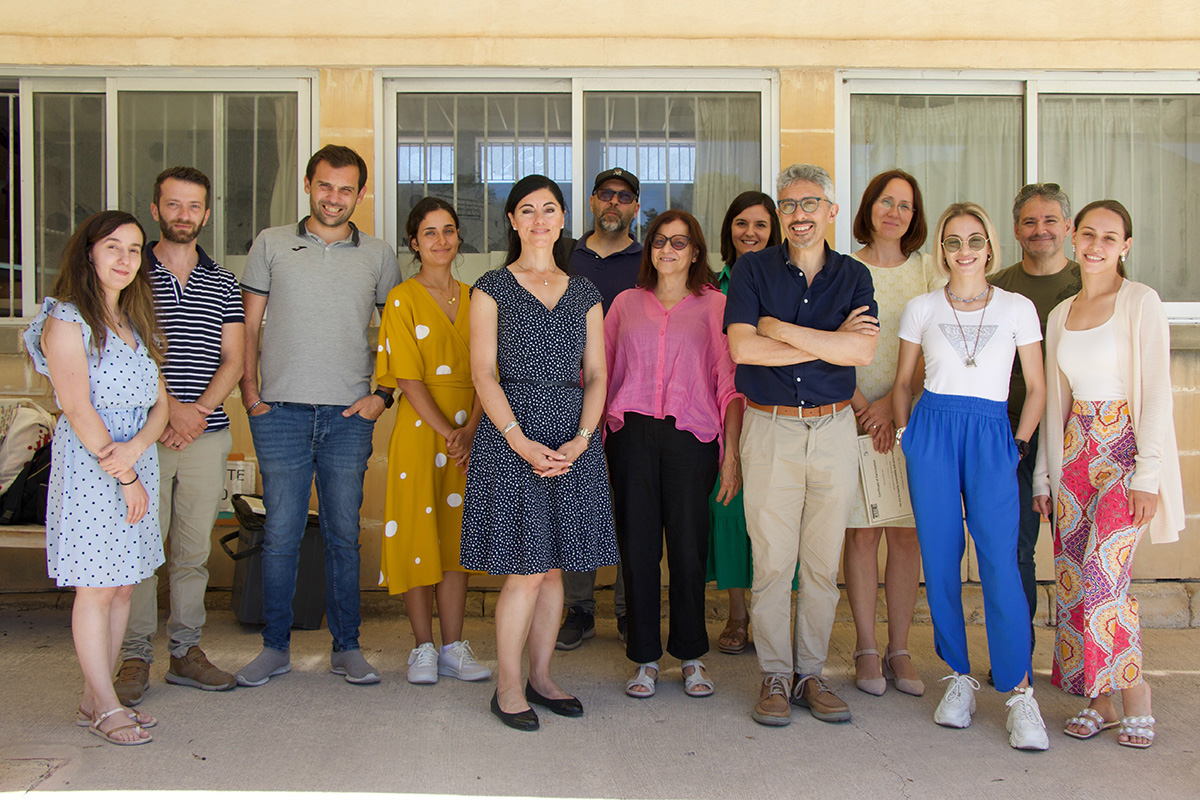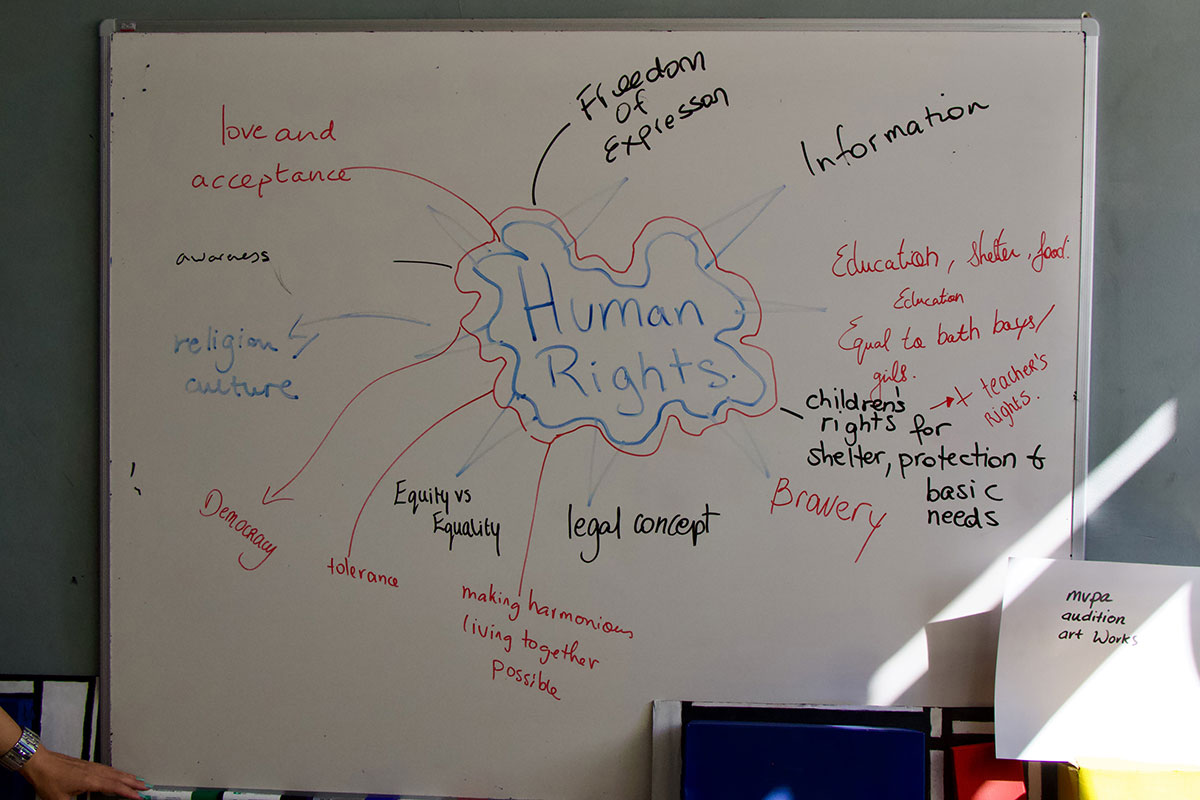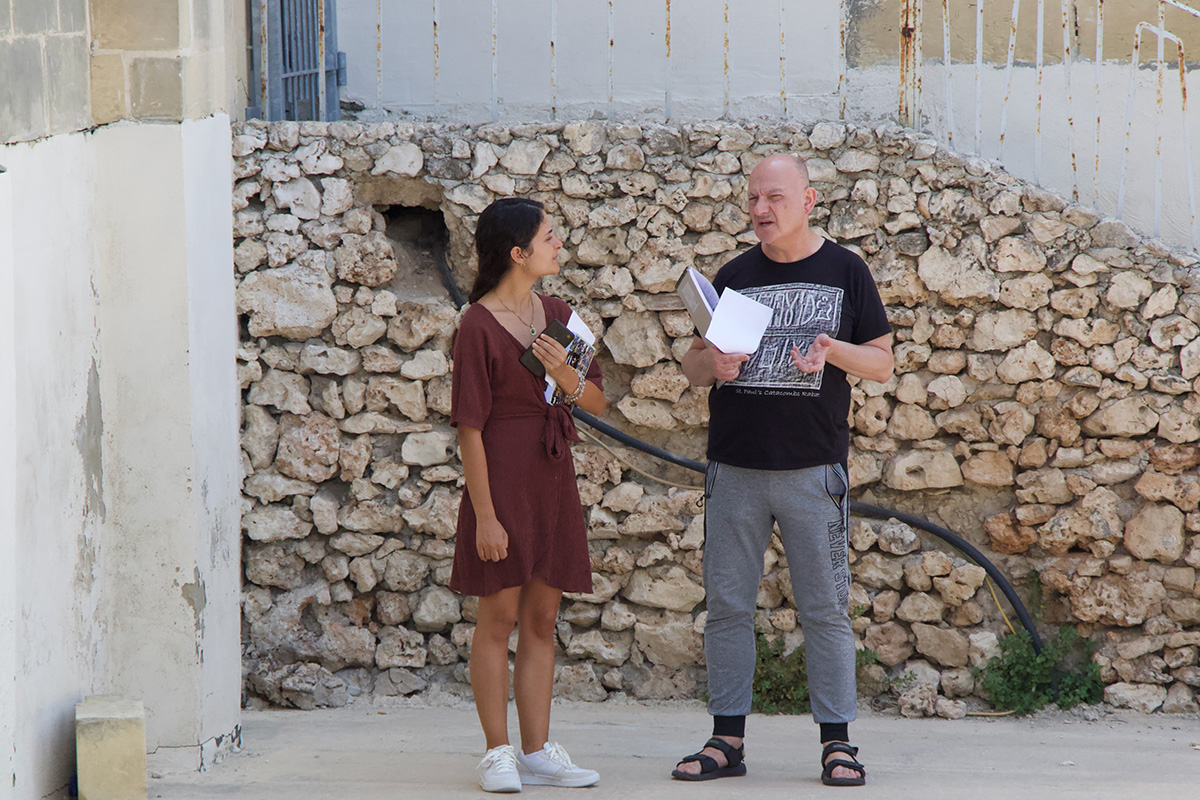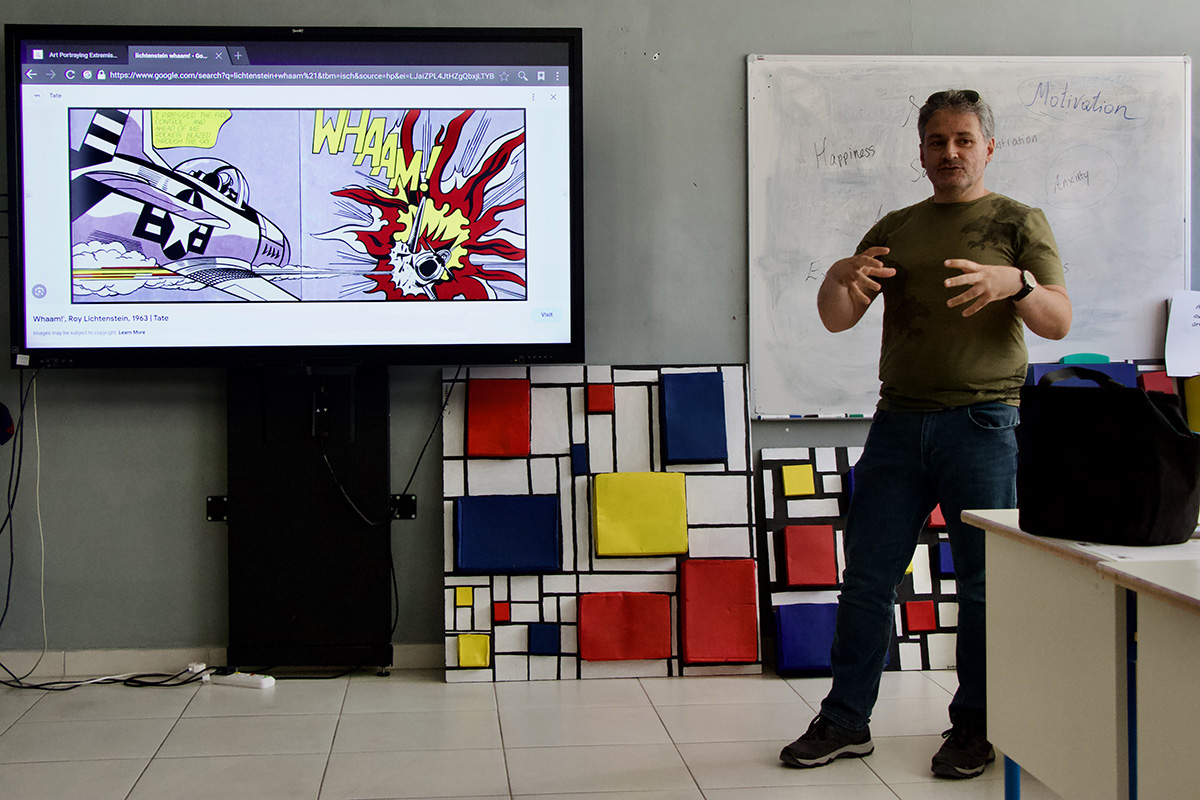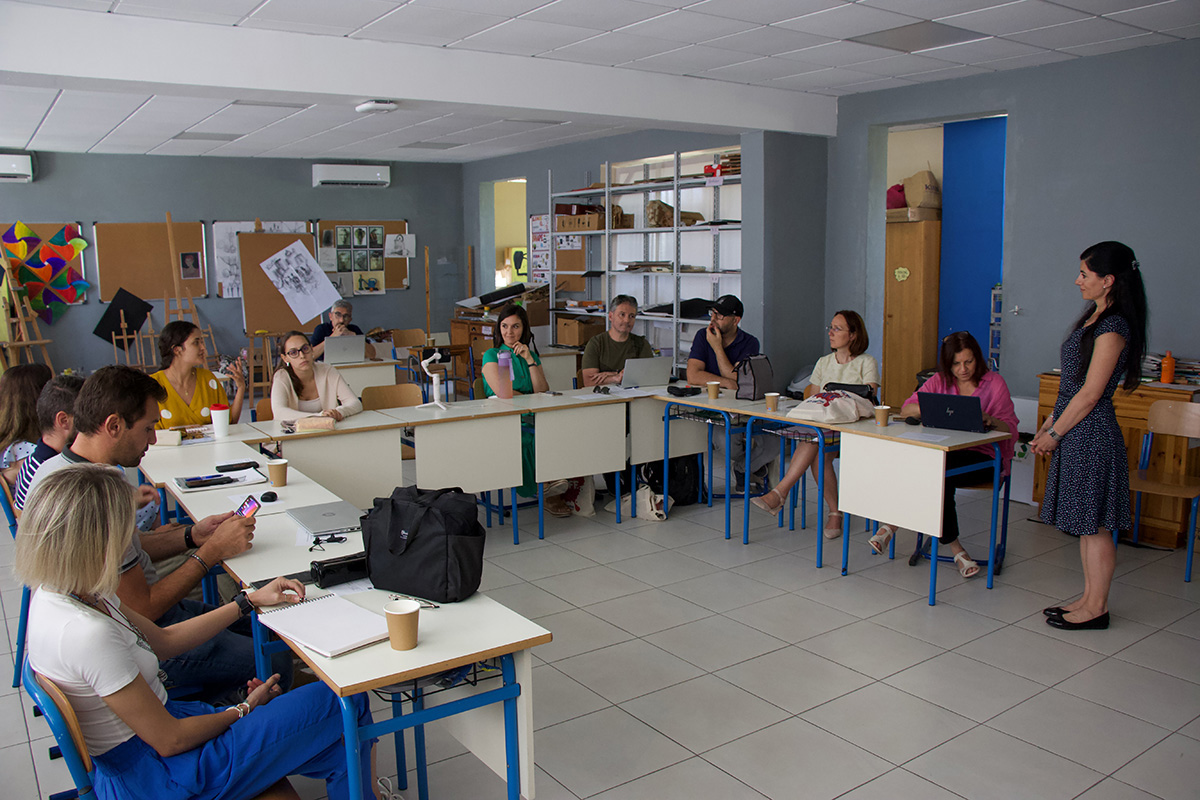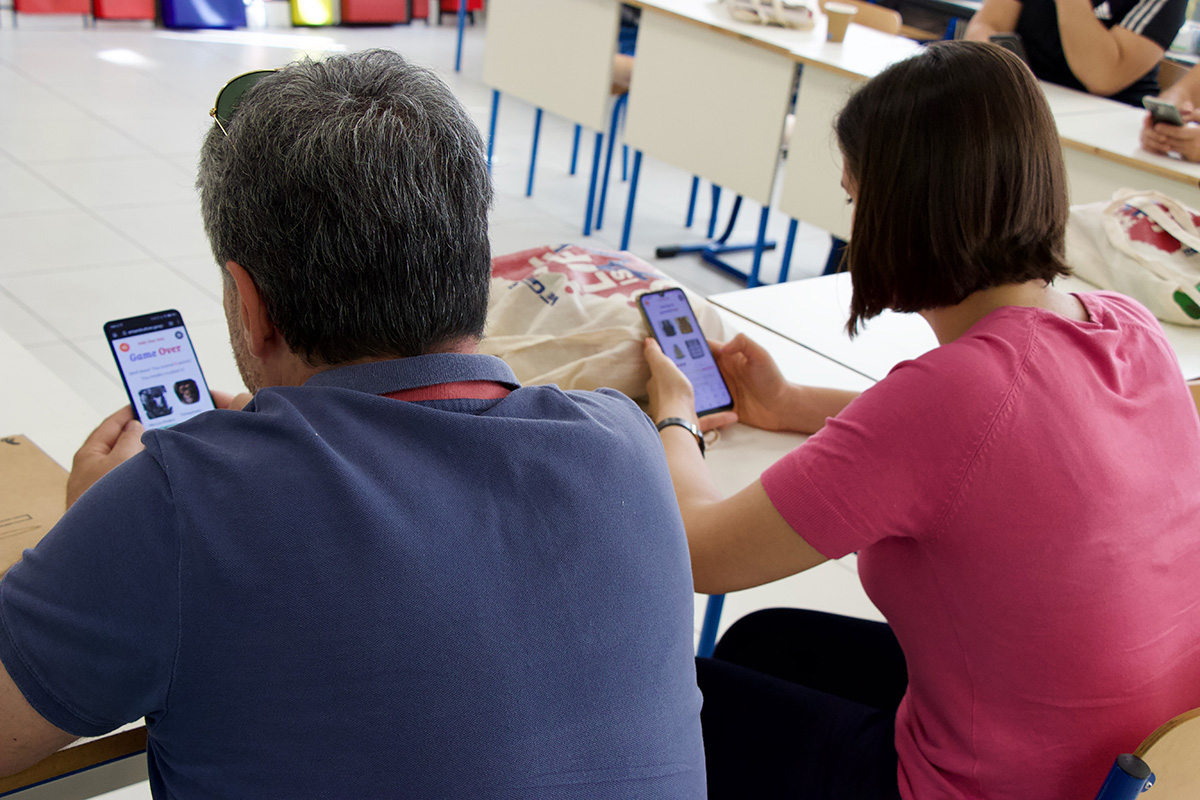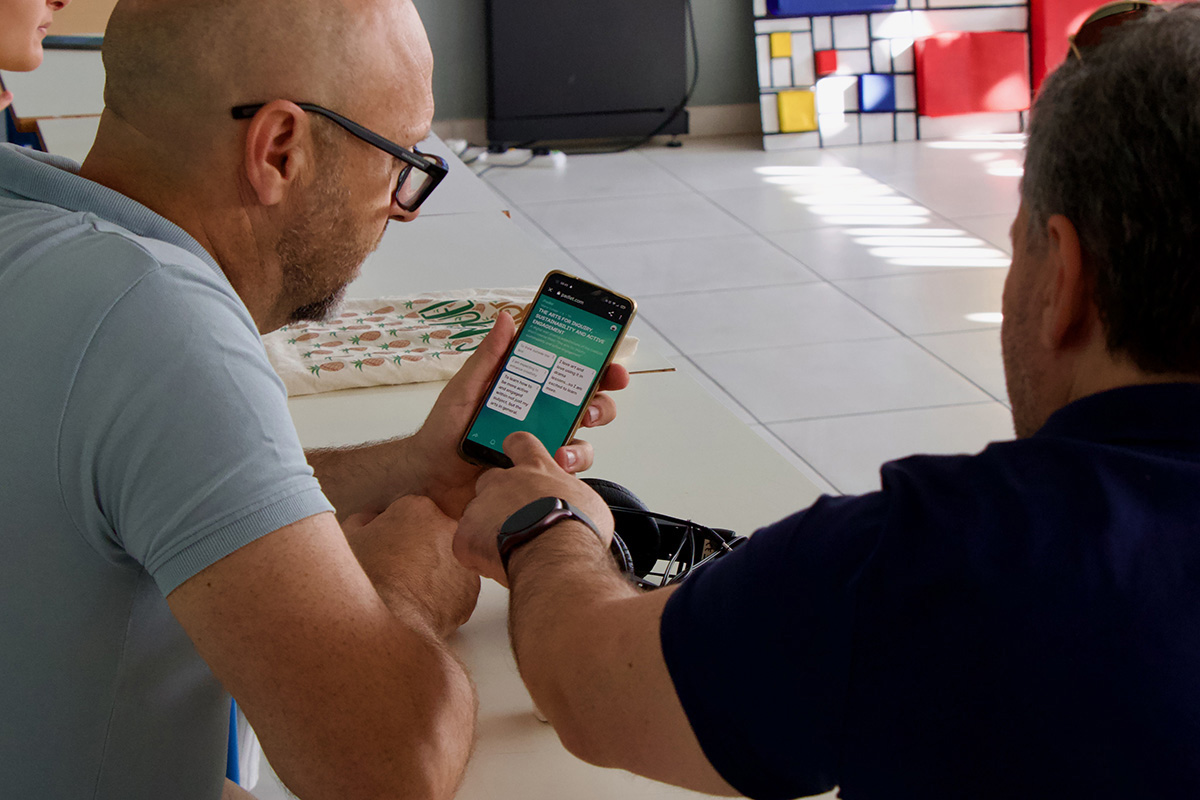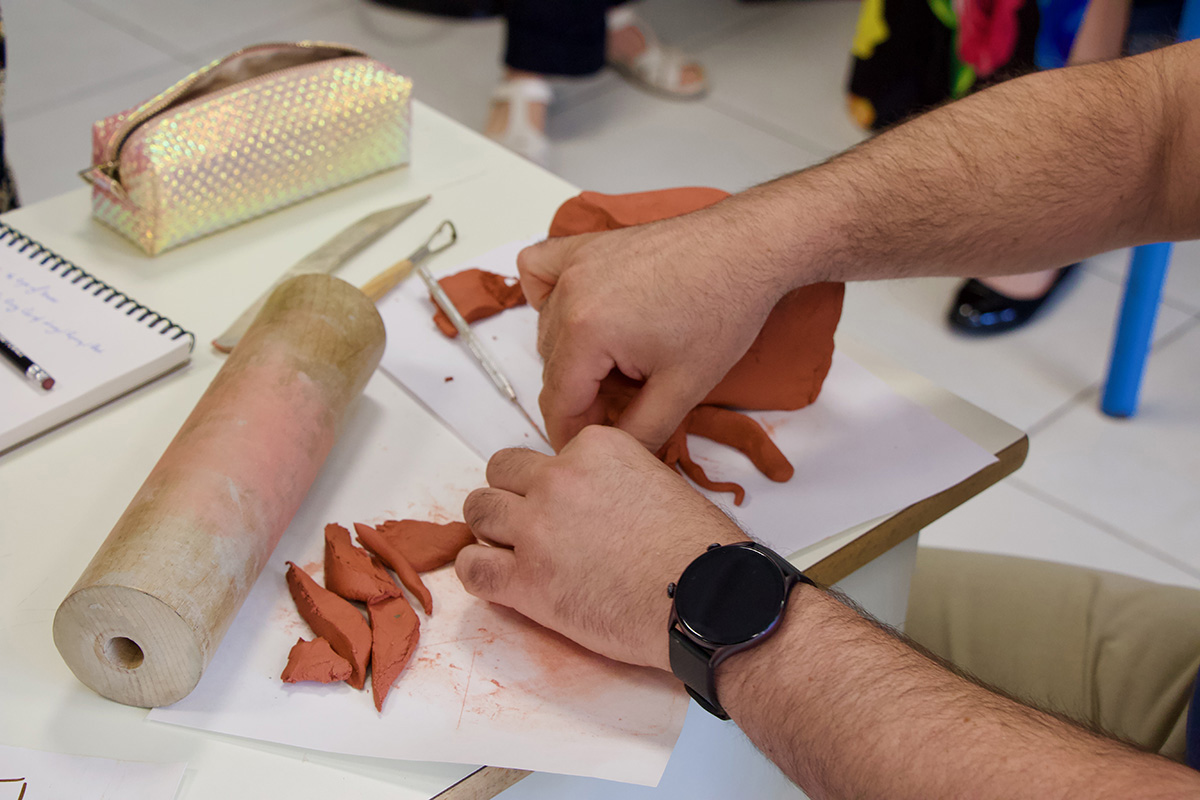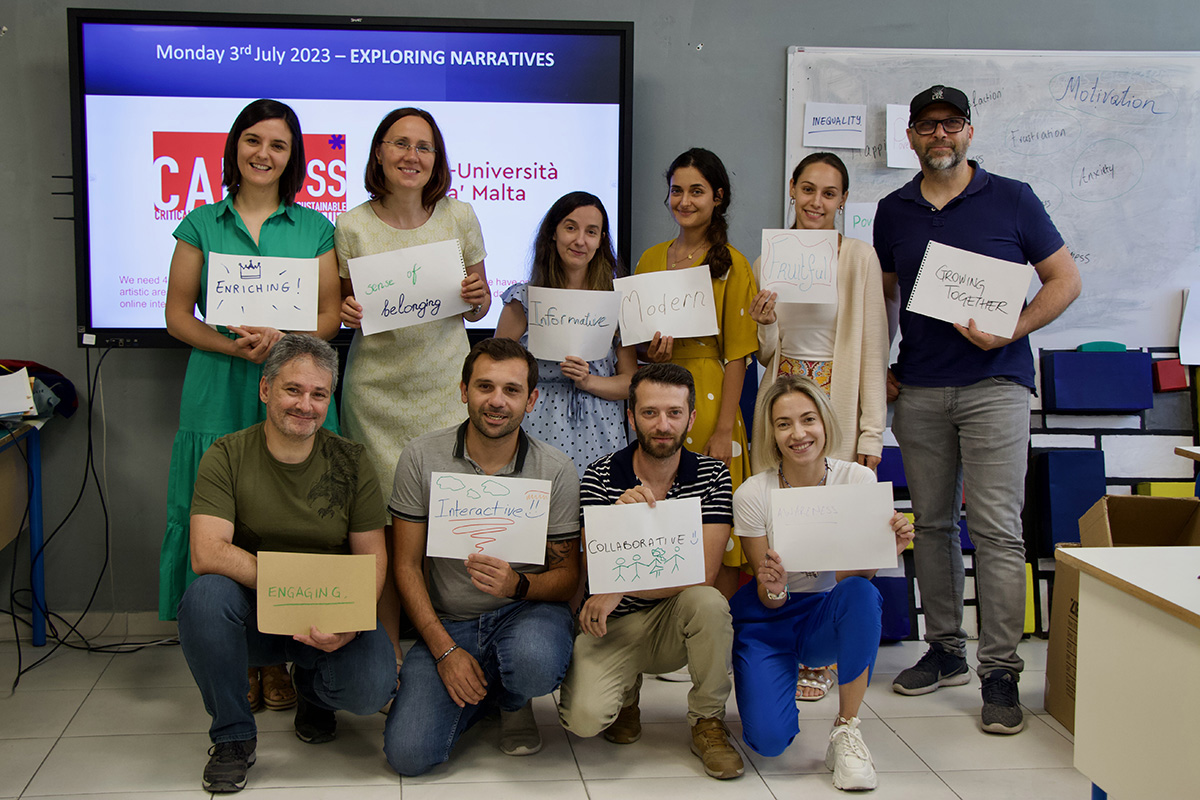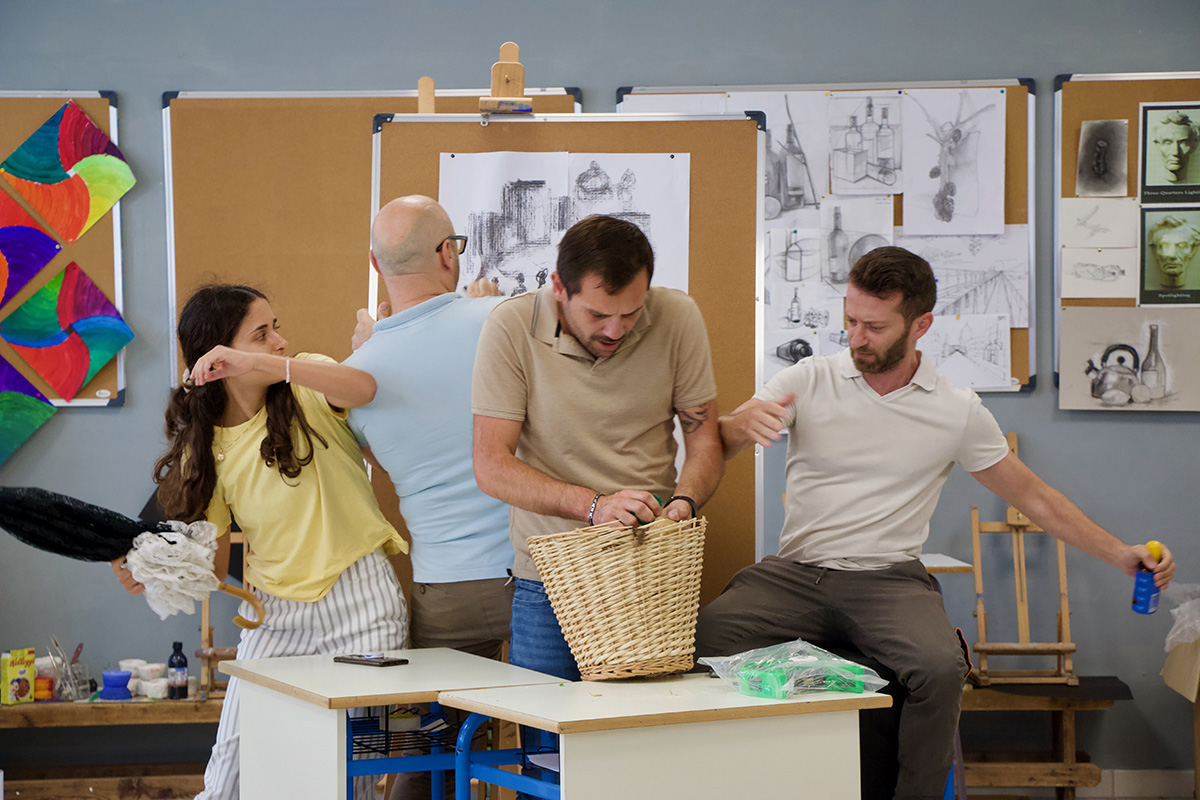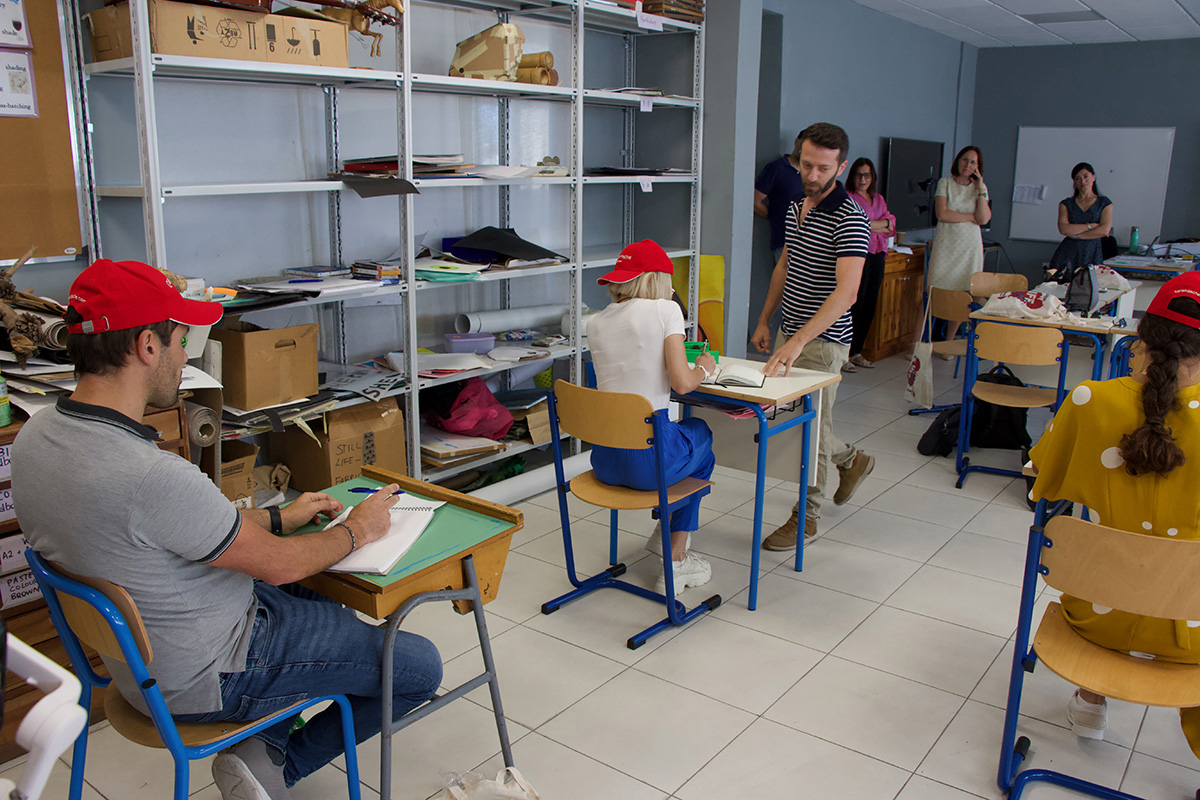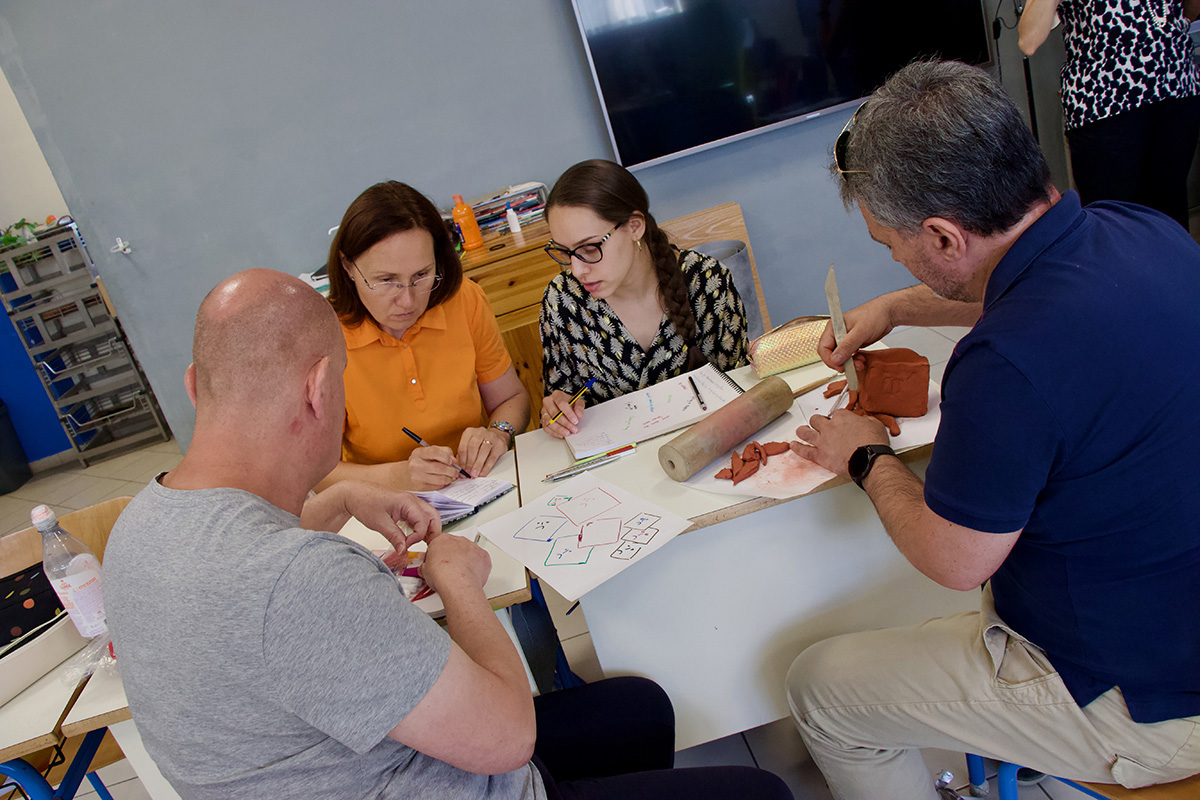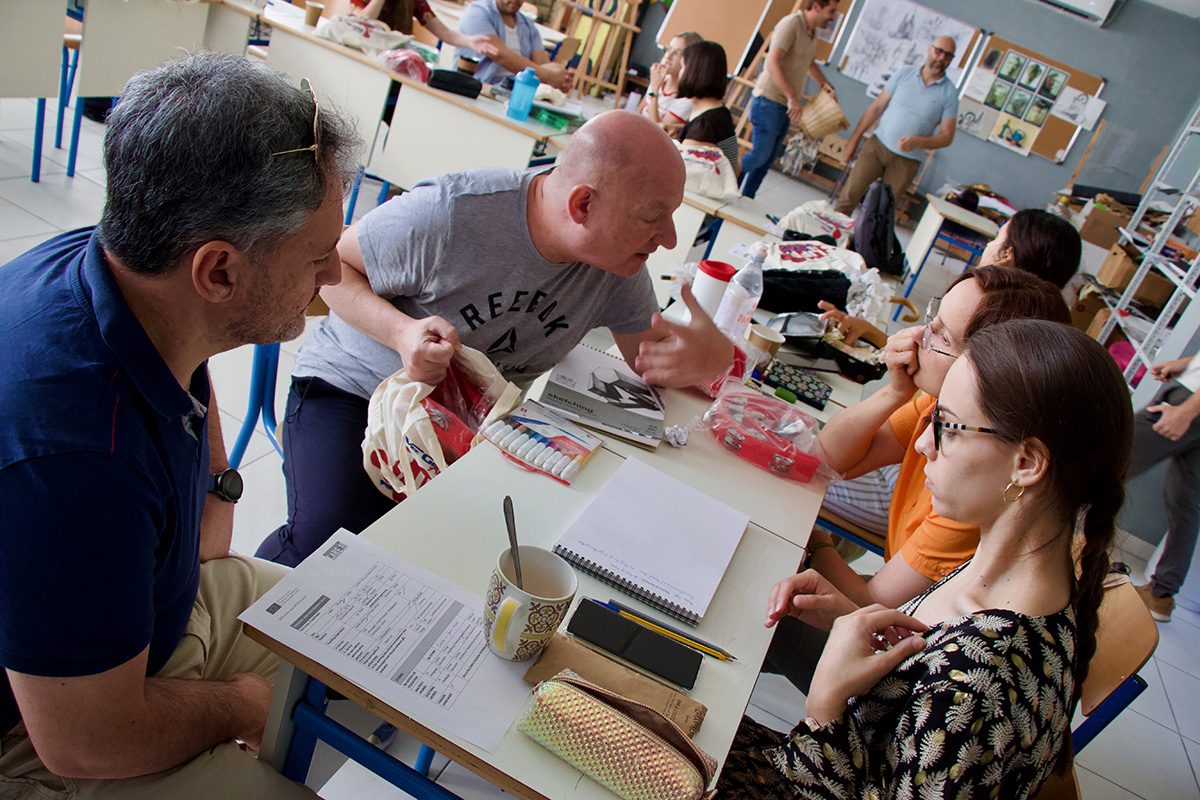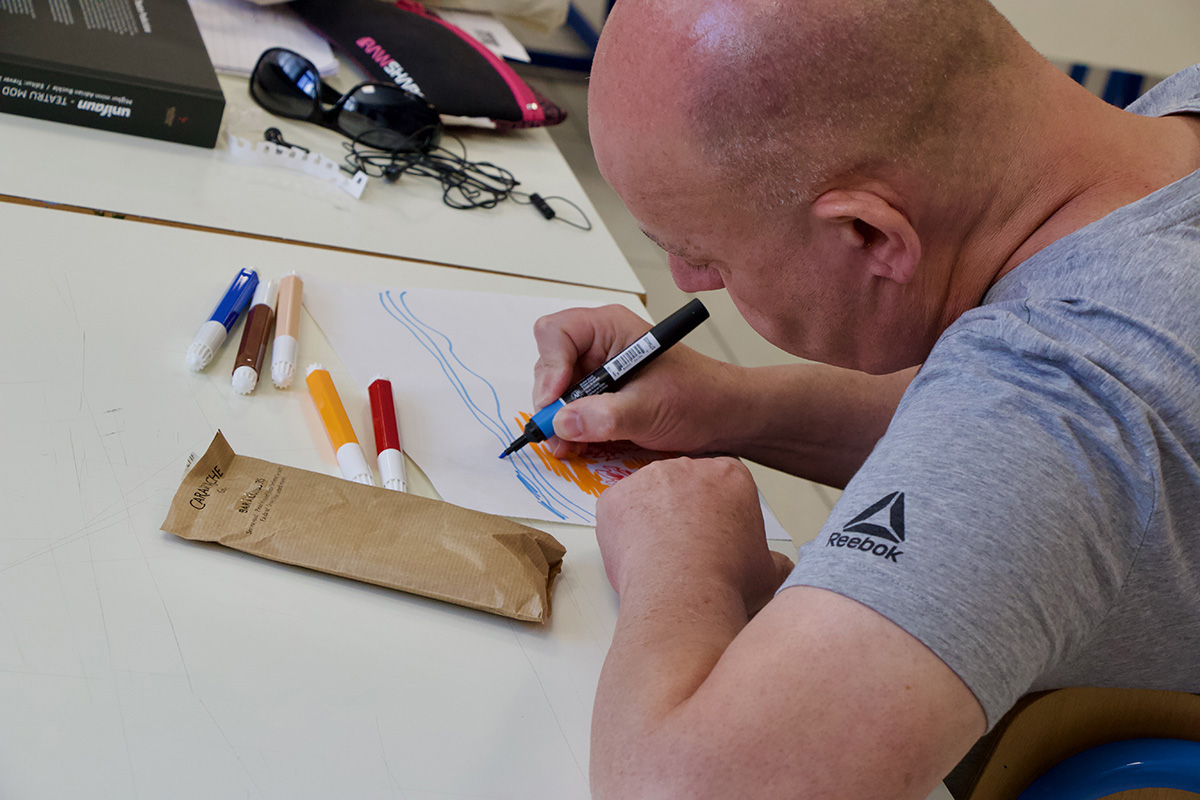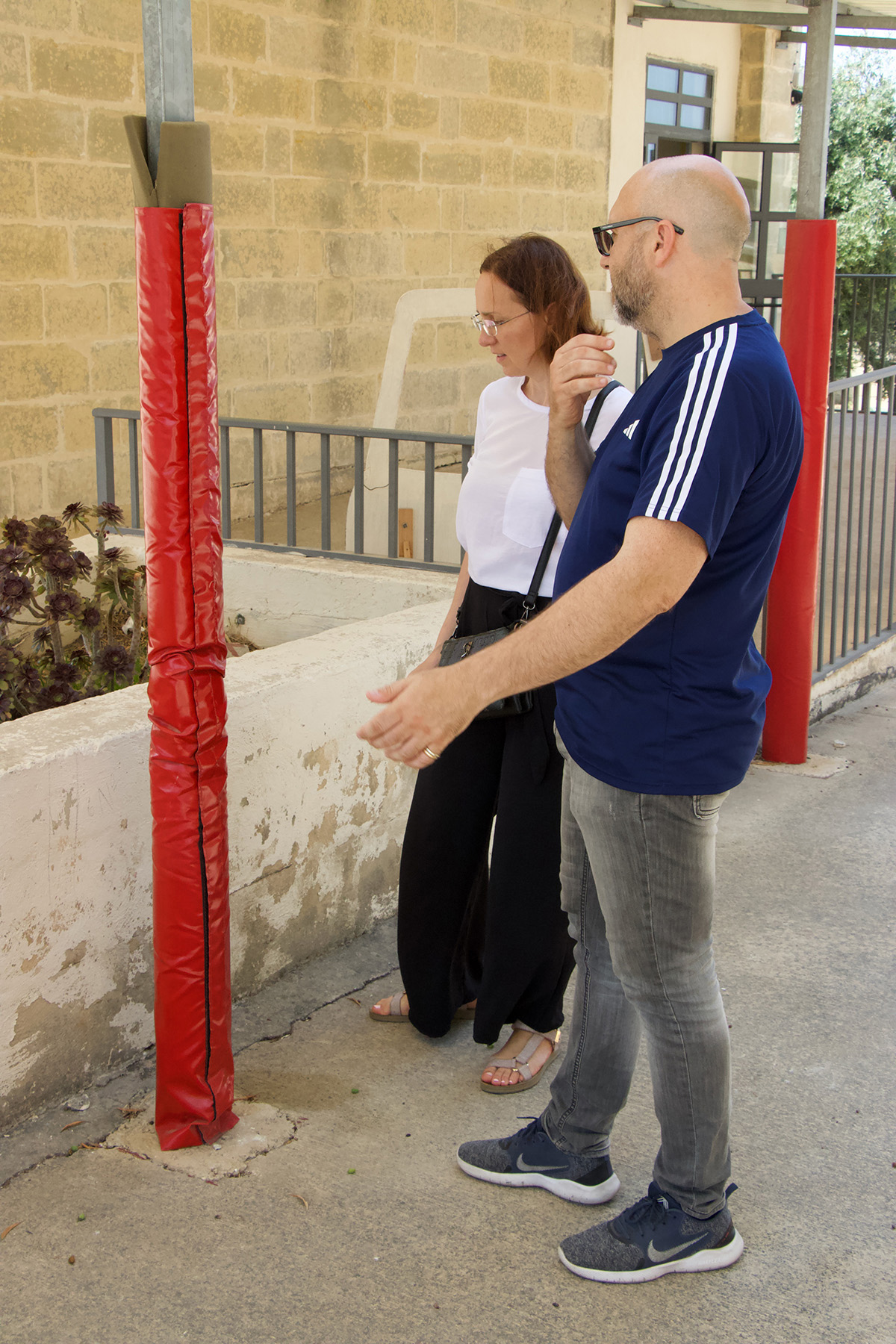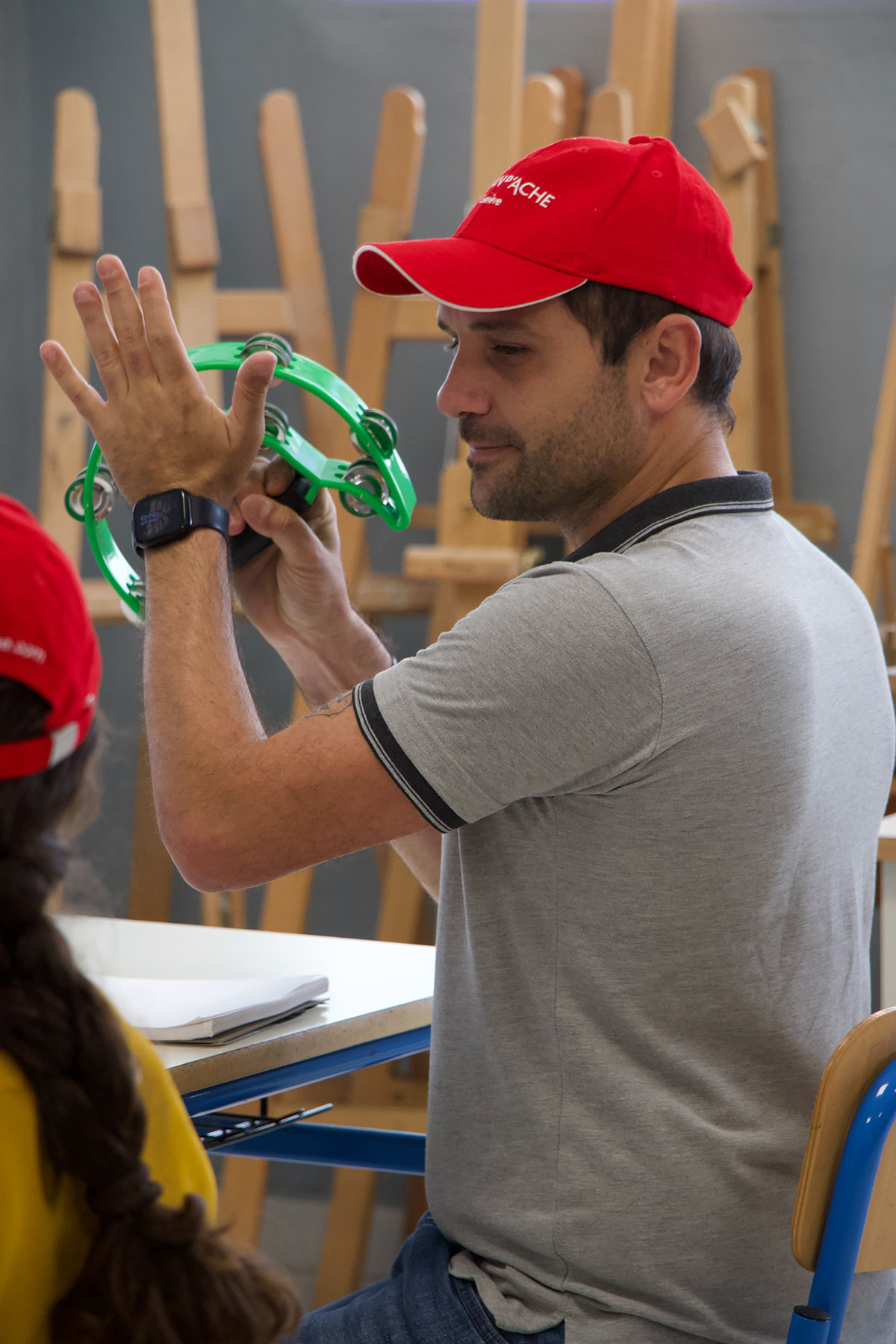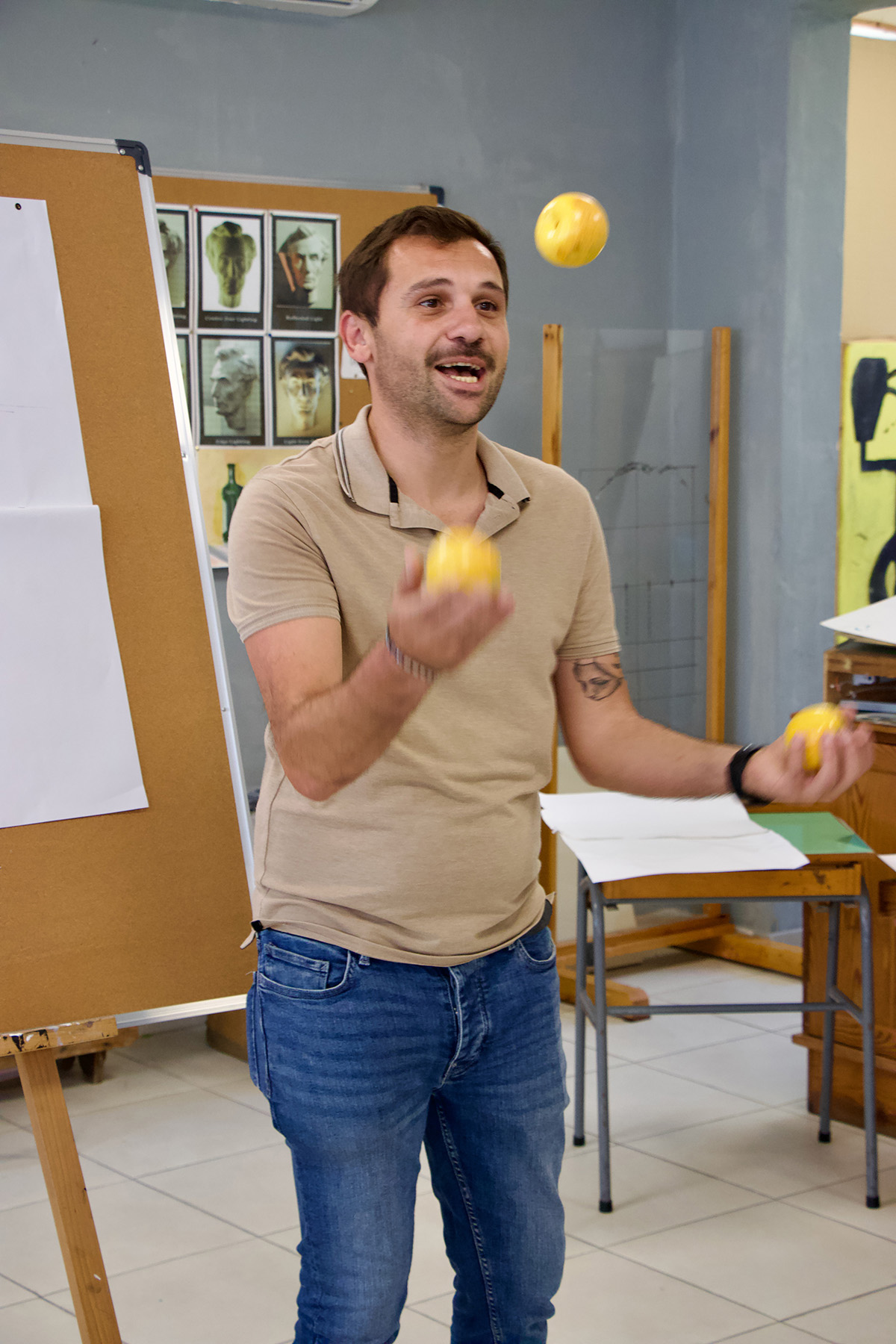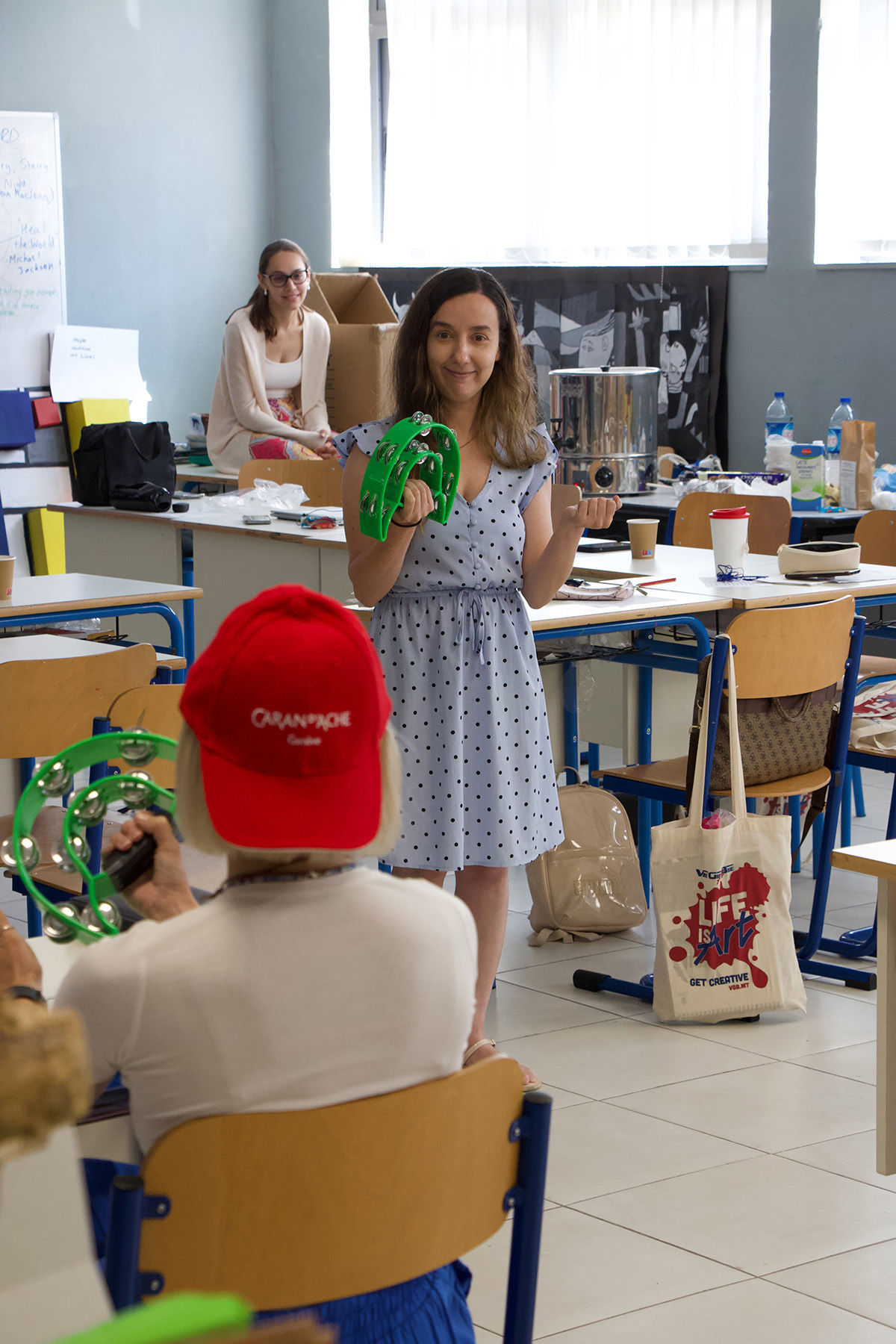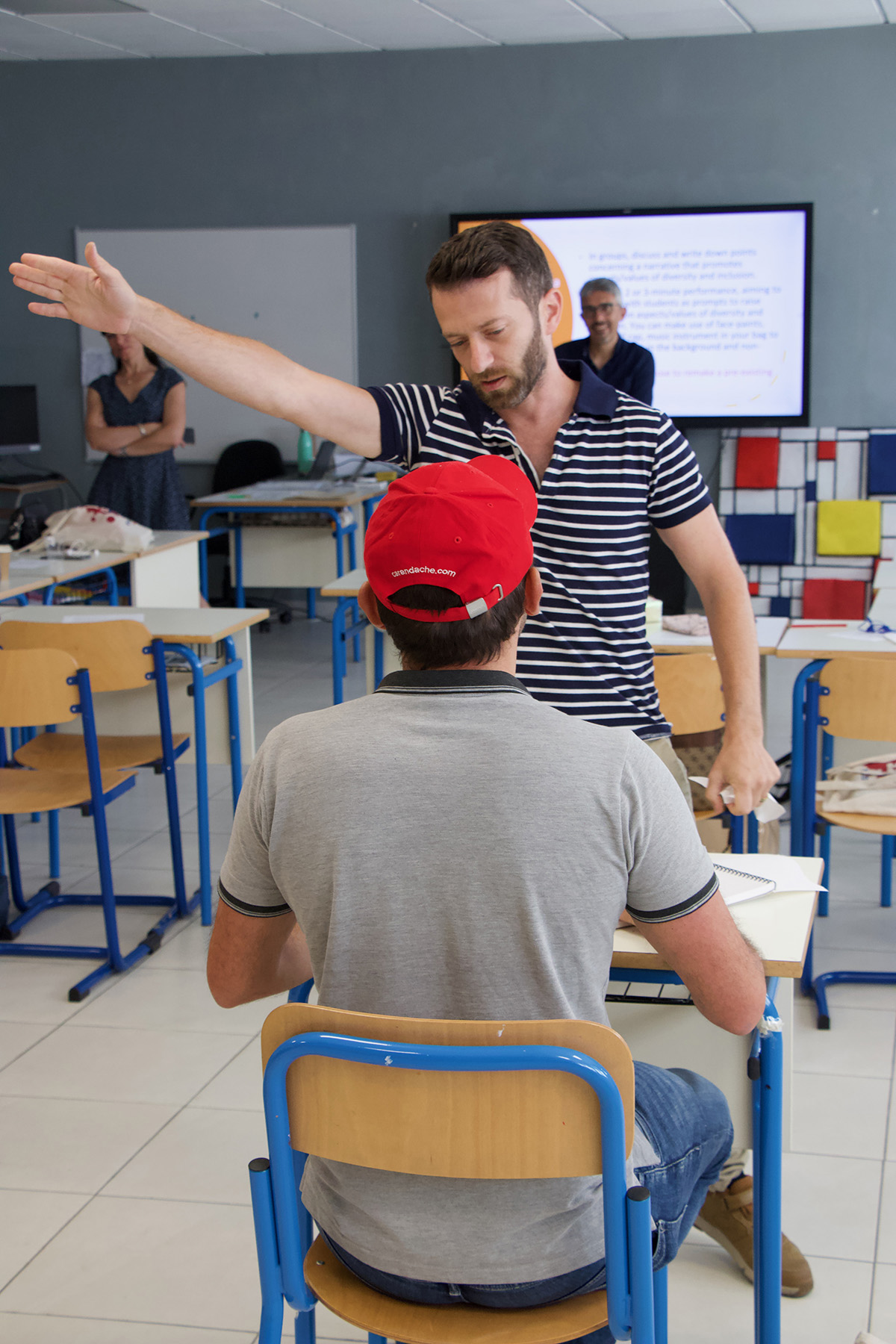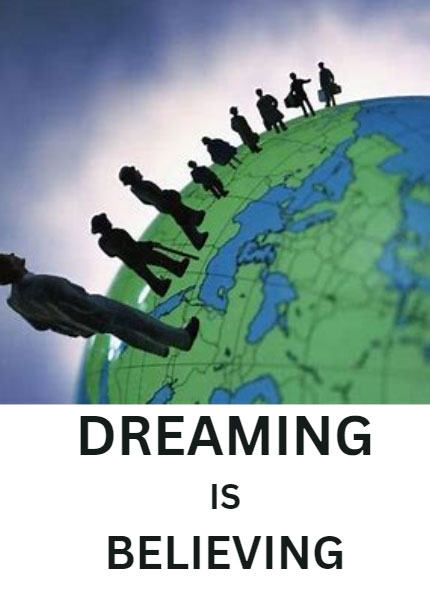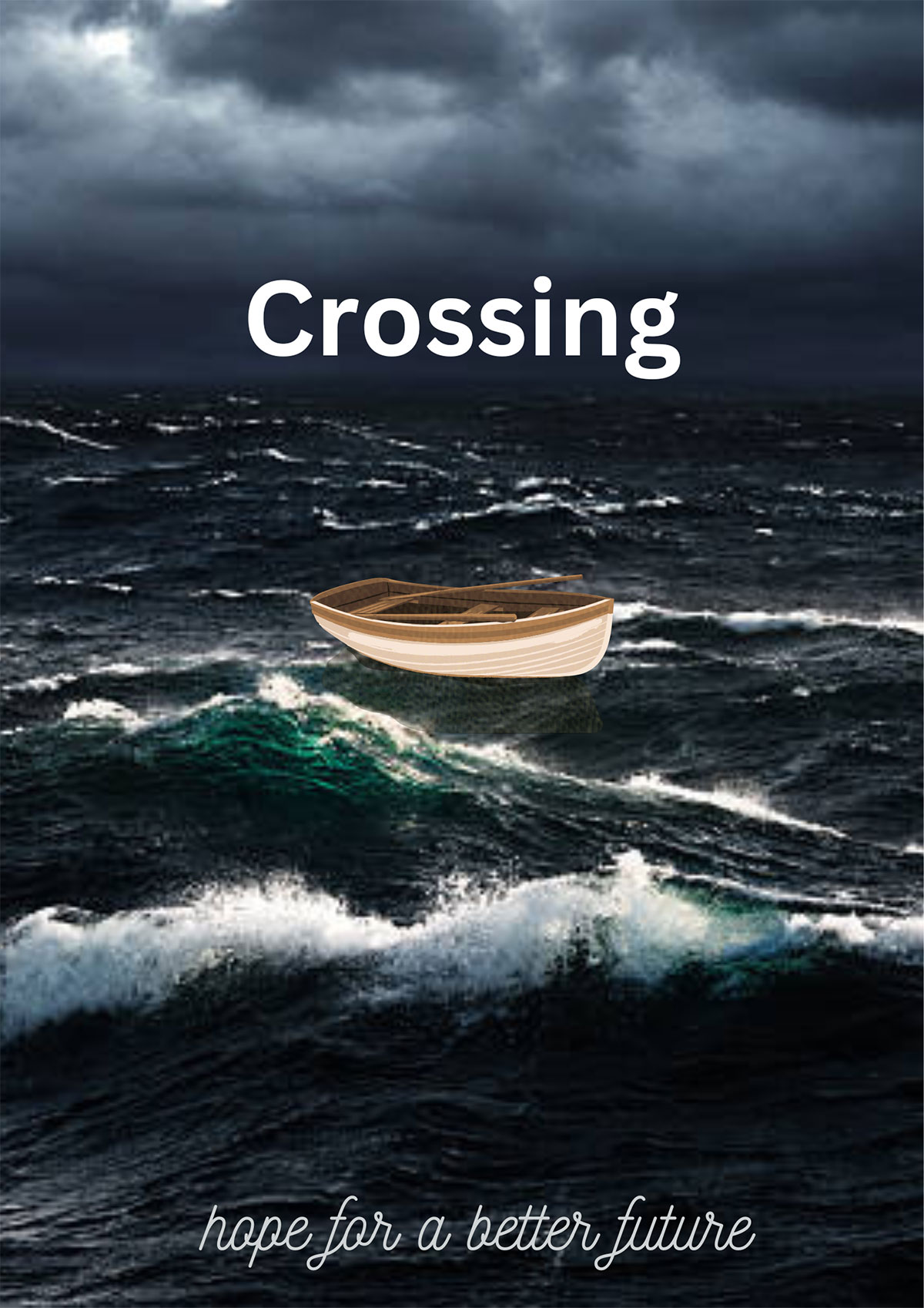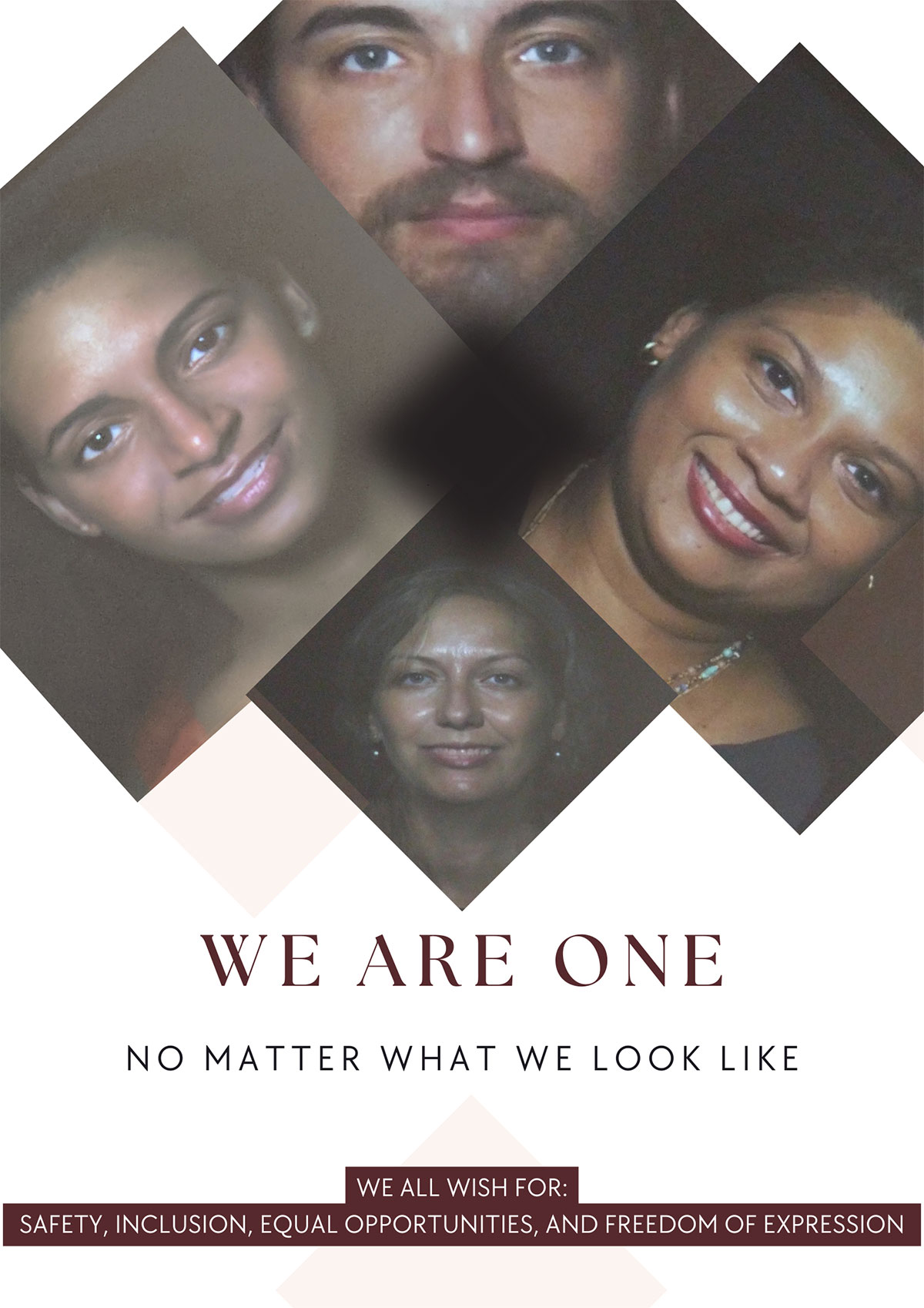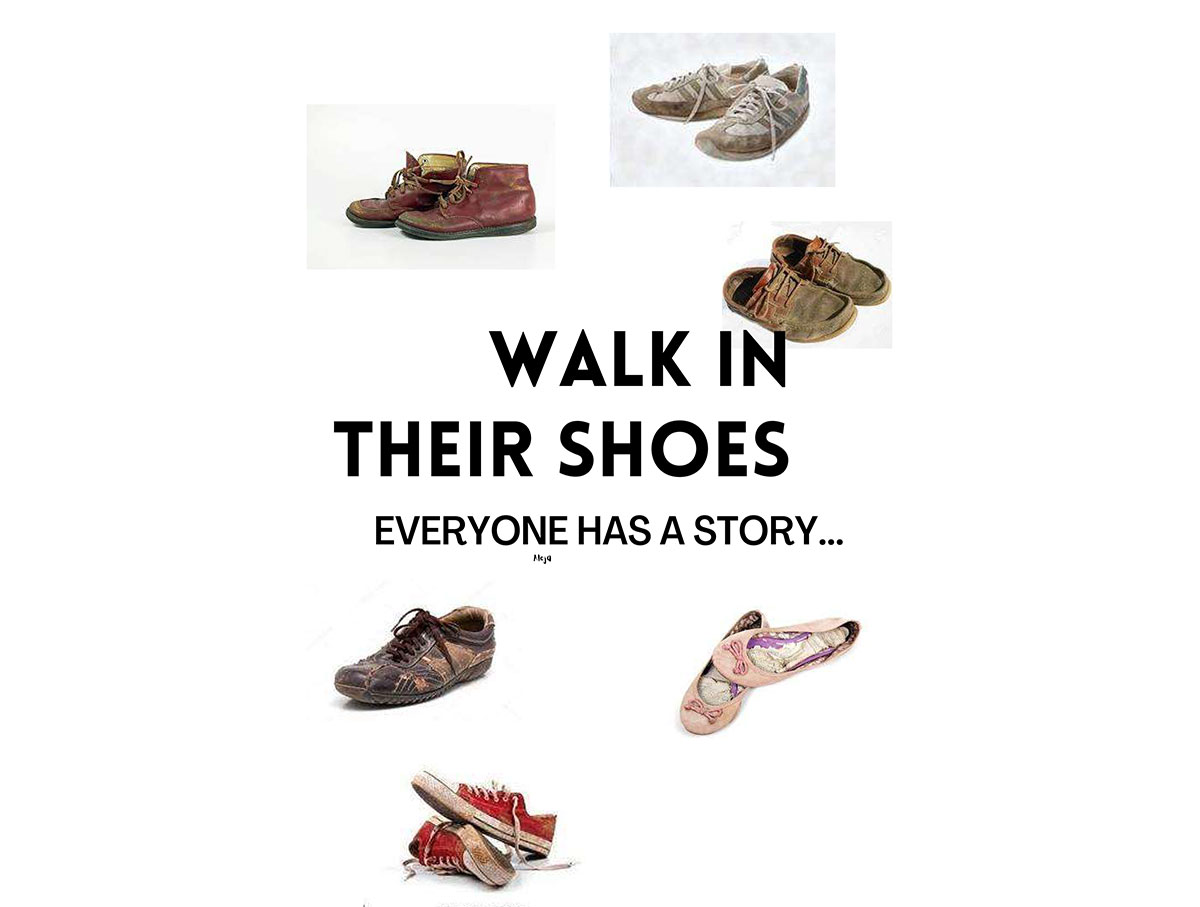Training offered by Frederick University (FU), Cyprus
FU offered three different pieces of trainings in the context of the CARE/SS project.
- Distance learning professional development training for in-service primary school teacher that incorporate visual arts, music, drama and creative writing activities.
- Distance learning course in Visual Arts Education for postgraduate teachers who were enrolled in the Distance Learning Masters in Educational Studies: Curriculum & Instruction
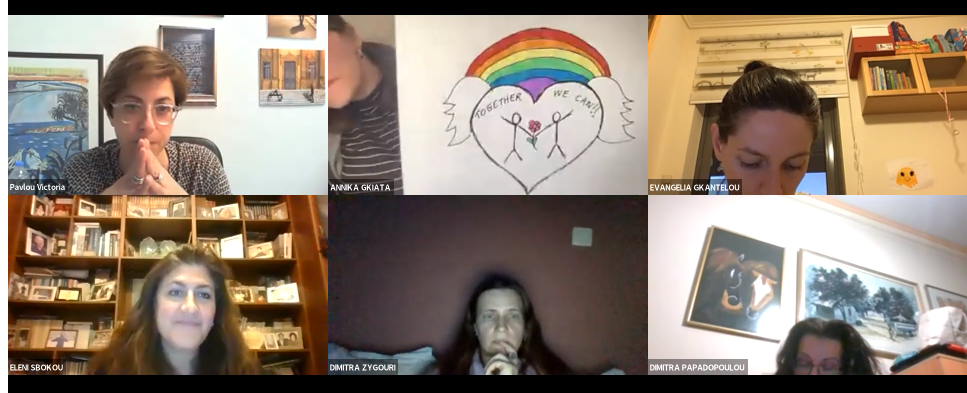 Synchronous meeting run as a workshop
Synchronous meeting run as a workshop
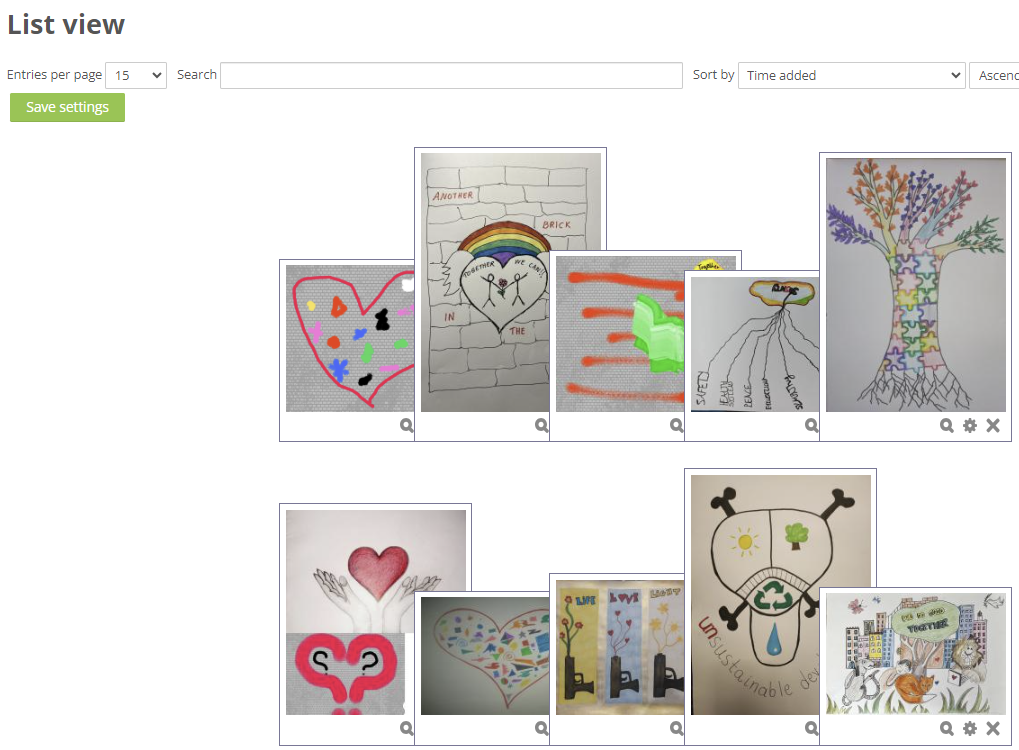 Art Gallery: Street art (Database option on Moodle)
Art Gallery: Street art (Database option on Moodle)
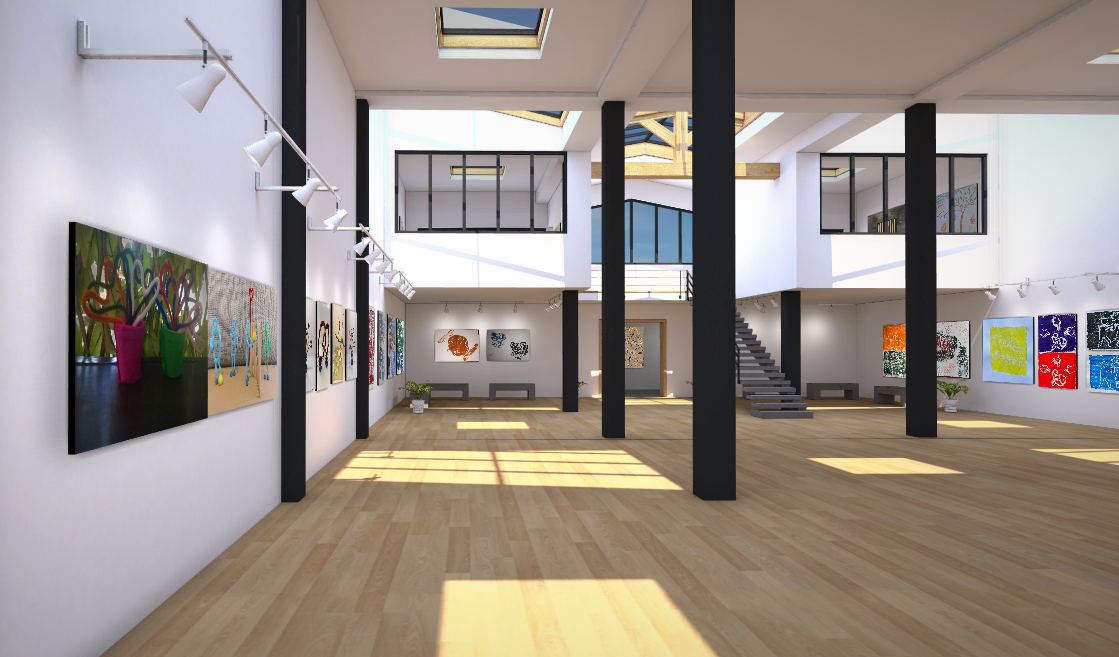 Visit our gallery for our final exhibition: https://www.artsteps.com/view/645cc30a3ed8db0e902095f8
Visit our gallery for our final exhibition: https://www.artsteps.com/view/645cc30a3ed8db0e902095f8
- Hybrid learning course in Music Education for undergraduate teachers who were enrolled in the BEd in Primary Education
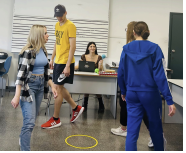 |
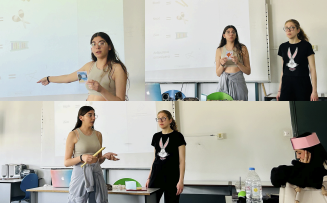 |
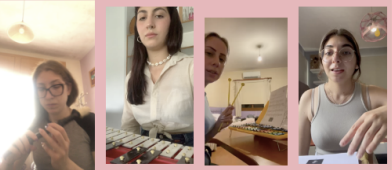 Video recordings (instrumental & vocal assessment)
Video recordings (instrumental & vocal assessment)Training offered by the Adam Mickiewicz University (AMU), Poland
The AMU team Will offer two courses:
- Drama Method for Social Inclusion in Teaching Practises
https://amupie.amu.edu.pl/1059/details
- Creative Arts for Social Inclusion
https://amupie.amu.edu.pl/1156/details
Course 1: Creative Arts for social inclusion
The aim of the course is to show the impact of art in a broad social context, especially working with disadvantaged groups, social inclusion, multicultural and intercultural education. During the classes, theoretical issues related to the use of art and Big Ideas to improve the quality of life of selected social groups will be presented.
During the classes, participants will learn how to respect and include in art classes their different cultural background and the diversity between them. As a result of the processes, they will create educational programs based on creative arts and intercultural exchange to improve the quality of life of selected social groups.
Course 2: Drama Method for Social Inclusion in Teaching Practises
The purpose of course is to increase participants' awareness of the possible usage of drama method and visual arts while working with multicultural groups. Participants develop their understanding of critical pedagogy, socially engaged arts and social sustainability with the usage of diverse arts disciplines and exchange their experiences in the field.
The programme is planned into four thematic blocks (introduction, peer exclusion, cultural diversity, drama in practice). Each block is opened with presentation of theoretical background (arranged with some real-time classes enriched with asynchronous activities). Afterwards students are emerged into the theme with experiential learning during workshop(s).
Training offered by the Aristotle University of Thessaloniki (AUTH), Greece
Course 1: Arts, Museums, and New Technologies / PG
- Postgraduate (MA) Training course
Participants: in-service primary school teachers
Duration: 39 hours (3x13) + 8 extra hours of lab familiarisation with specific digital tools, Winter 2022-23 - Instructor: Martha Ioannidou
Aims & rationale:
The course delves into the complex theory and practice issues surrounding teaching and learning in cultural spaces, particularly museums and art galleries, using information and communication technologies (ICTs). This year aimed to focus on the pedagogical dimension of critical education through the arts, which aimed to contribute to a more holistic approach to socially engaged arts presented in public spaces, museums, or other cultural spaces; it was adapted to the new reality of digital technology.
The course adopted a blended learning framework, with socially engaged arts actions grouped according to the PR2 guide and the Big Ideas.
Courses 2 & 3: Art and Society: Critical approaches
- Undergraduate course for primary school teacher-students.
- (1) Training Course in Greek and (2) Training Course in English for foreign Erasmus students
- Duration: 40 hours -Blended learning, Winter semester October 2023-15 January 2024.
- Instructors: Martha Ioannidou, Soula Mitakidou, Antonis Lenakakis
- eLearning asynchronous: Quizzes, videos, course- material, virtual museum tours, and implementation of digital applications to help students get inspired and engage in a critical pedagogical approach to social issues, e.g., 1 Padlet and 1 Canva joint activities.
Aims & rationale:
This course attempted a critical approach to the relevant literature and study/present artistic practices related to Socially Engaged Arts [SEA], critical pedagogy, sustainability, and arts education. The aim was to embed broader principles of social justice and participatory approaches in arts education pedagogical practices, while promoting sustainable development principles and raising awareness of these issues.
The application of theory in practice also aimed to discuss with students current methodological tools, appropriate ways of using the online and/or mixed mode of delivery, types of artistic practices/activities and developed teaching models.
questions, which referred to the content, the way of teaching, the way of evaluation and the contribution of the course to their scientific development.
https://www.artsteps.com/view/63caa589c0a4cb48a02ae5f8
The exhibition focuses on the multicultural city of Thessaloniki, referencing the communities that coexisted between the 19th and 20th centuries and the interaction between them. On the exhibition's perimeter walls, you can browse exhibits that refer to the communities that coexisted in the city, thus approaching many aspects of their daily life. On the central perimeter wall, two maps depicting Thessaloniki's time frame and a video panorama of Thessaloniki at the time. On the walls in the centre of the exhibition space, photographs, texts, sayings, and songs highlight the city's multicultural character. The exhibition photographs present the coexistence of the different cultures of Thessaloniki, thus proving that the diversity of these peoples was not a barrier to their harmonious coexistence and interaction.
Training offered by the University of Malta (UOM), Malta
The images show participants’ works and work-in-progress from both Course 1 (blended) and course 2 (in person). Images from Course 1 demonstrate participants’ creative works and reflections, while those from Course 2 show participants’ creative process, their presentations and performing actions. Captions are the name of the images.
Posters were created by teacher-participants of Course 1 (blended) and their quotes indicating the posters’ rationale, inspired by the big ideas. Images and quotes were shared on the online platform (VLE) where the tutor and other participants could exchange feedback and reflections.
Crossing by Mark Anthony Lughermo - Thursday, 15 June 2023, 10:23 AM
“This poster is inspired by the dangerous journey refugees embark on. The 300-mile stretch between Libya and Sicily is known as the refugee graveyard. The sea has claimed more than 400 lives this year and the death toll is still rising. There are more than 100 million refugees and displaced people around the world hoping for a better future”.
We are one by Sara Pace - Thursday, 15 June 2023, 12:37 PM
“Everyone wants to be given the opportunity to achieve their dreams, within the limits of society. We are all human with needs of integration, acceptance and the freedom to express ourselves, thus becoming part of the society one moves to or is born in, whether one is visually similar to the main populace or not, is of utmost importance. Barriers need to be overcome by all elements of society, and a need to eliminate the perception of 'us vs them' from all participants in an active and sustainable society is the basis of initiating a healthy collaboration that would enable a society to grow and progress”.
Walk in their shoes by Estelle Buttigieg - Saturday, 10 June 2023, 9:49 PM
“This poster is meant to encourage people to stop and listen to each other. Listening is powerful. Once you make that step and listen you making that person feel important. But also, it will open a world of learning. This poster reminded me of the monument of the 'Shoes on the Danube Promenade’ in Budapest, Hungry. It is a memorial for the Jews died in the Holocaust in Hungry. It is a reminder that we are all humans and have dreams, aspiration and wanted to be loved and belonged”.
The 3 videos show the Microteaching of Group 1 and Group 2 during Course 2 at MVPA (Malta Visual and Performing Arts) school, focusing on themes of ‘Respect for Diversity and Inclusion’ and ‘Peace, Justice and Strong Institiutions’.
Video 1 shows the contrasting teaching approaches, where a teacher excludes a student who was more artistically inclined and needed further explanation in languages, while he praised and provided attention to the students who could understand. Meanwhile the music teacher not only provided attention to all students, regardless of their music ability but also encouraged the artistically inclined student to further on his studies.
Video 2 shows the introduction of the session where the teacher is guiding the students’ creative process which involved listening to Prokofiev’s Sonata No. 6 and reflecting on the emotions generated. This led them to think of movements/actions that can reflect such emotions. The teacher invited students to explore the presentation on Google Arts & Culture, whilst explaining that conflict is often the result of extremist behaviour.
This microteaching continued on Video 3, where the students started performing the emotions provoked by the music. Later a reproduction of Roy Lichtenstein’s “Whaam!” painting was introduced alongside with comic art that was used as propaganda during world war II. The students were invited to use the Art-in-a-Bag materials to produce a comic strip cartoon which narrates a short story related to conflict.
Course 1: Contemporary social issues and socially engaged arts in education
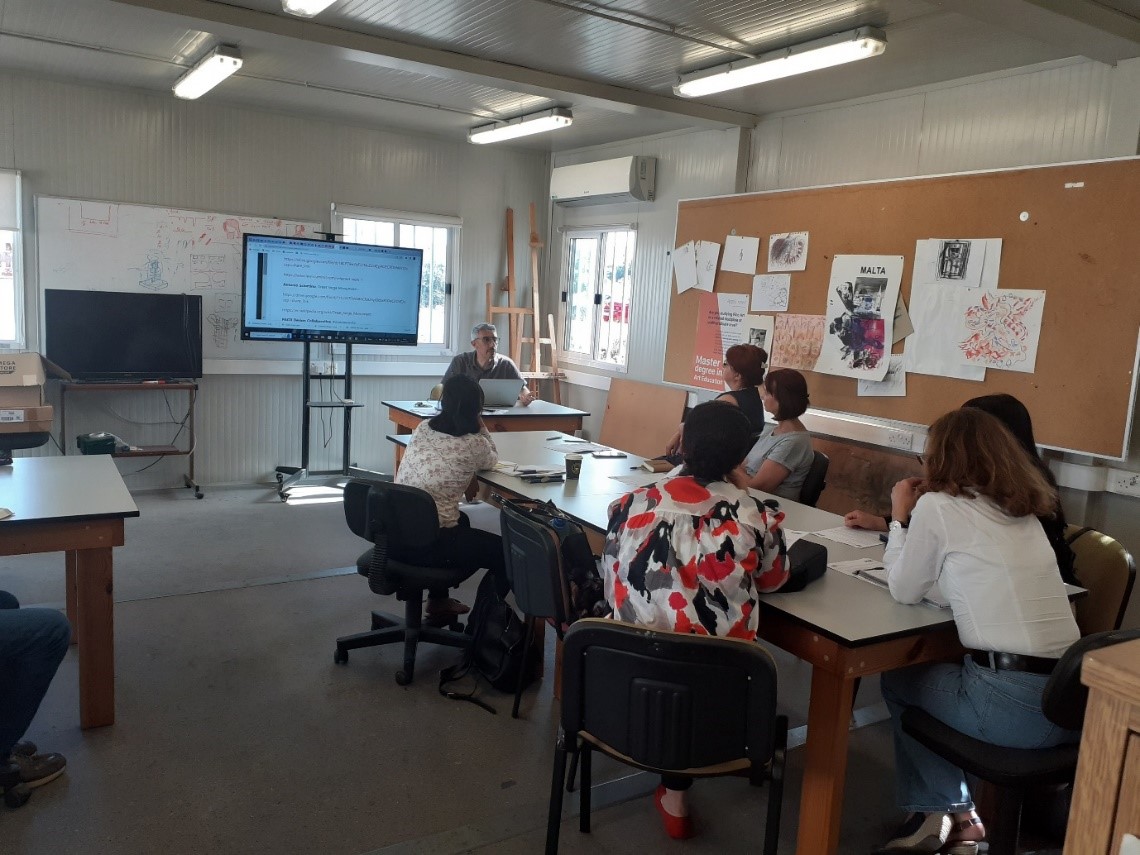
The first session of Course 1: Contemporary social issues and socially engaged arts in education, held in the art studio at the University of Malta, was face-to-face and attended by teachers based in primary and secondary schools around Malta.
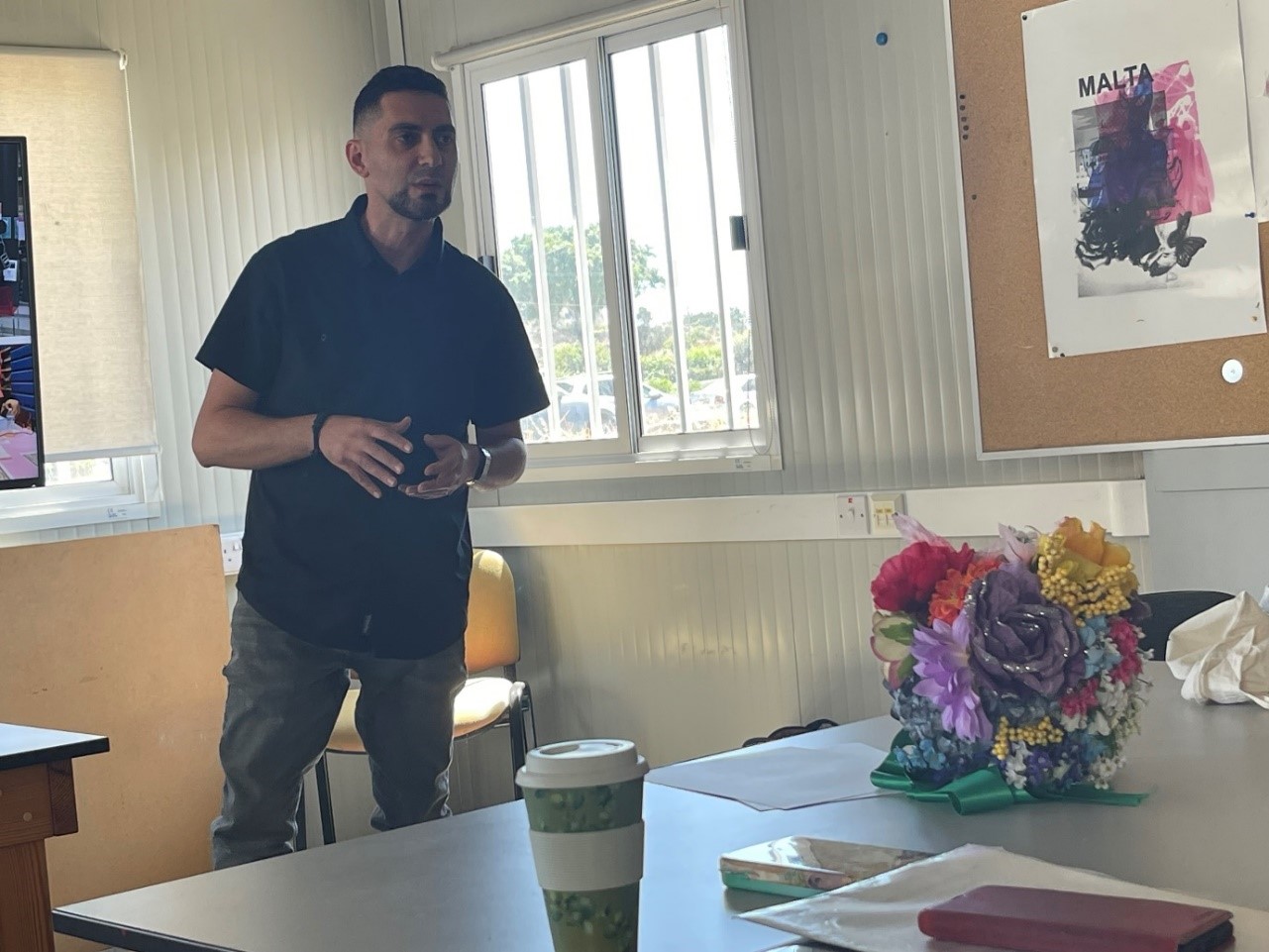
Mark Anthony Lughermo, a secondary art teacher attending Course 1: Contemporary social issues and socially engaged arts in education, delivers his micro-teaching tasks and presentation in the final face-to-face session held at the University of Malta.
Course 2: The arts for inquiry, sustainability and active engagement
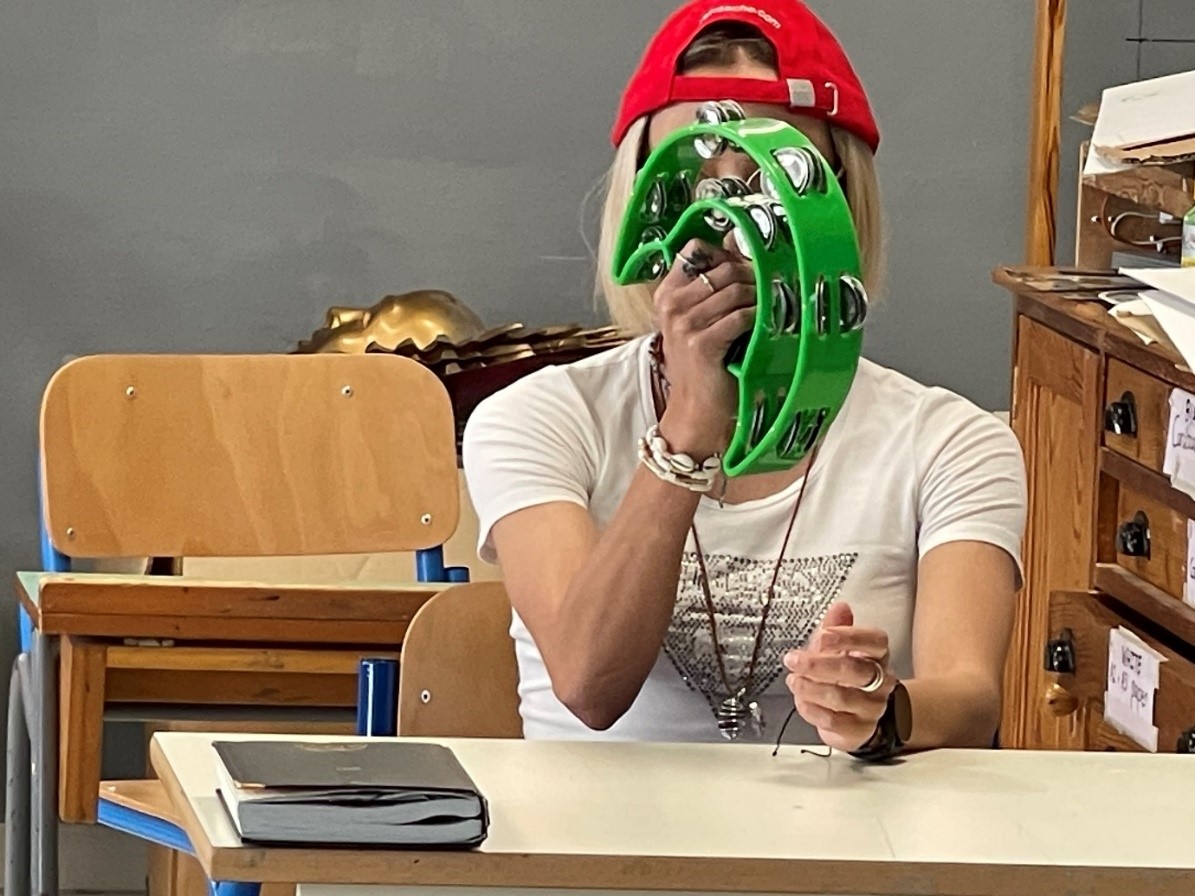
One of the participants in Course 2: The arts for inquiry, sustainability and active engagement during one of the creative tasks held at the Malta Visual and Performing Arts school. During this task, participants used some of the items included in their ‘Arts in a Bag’.
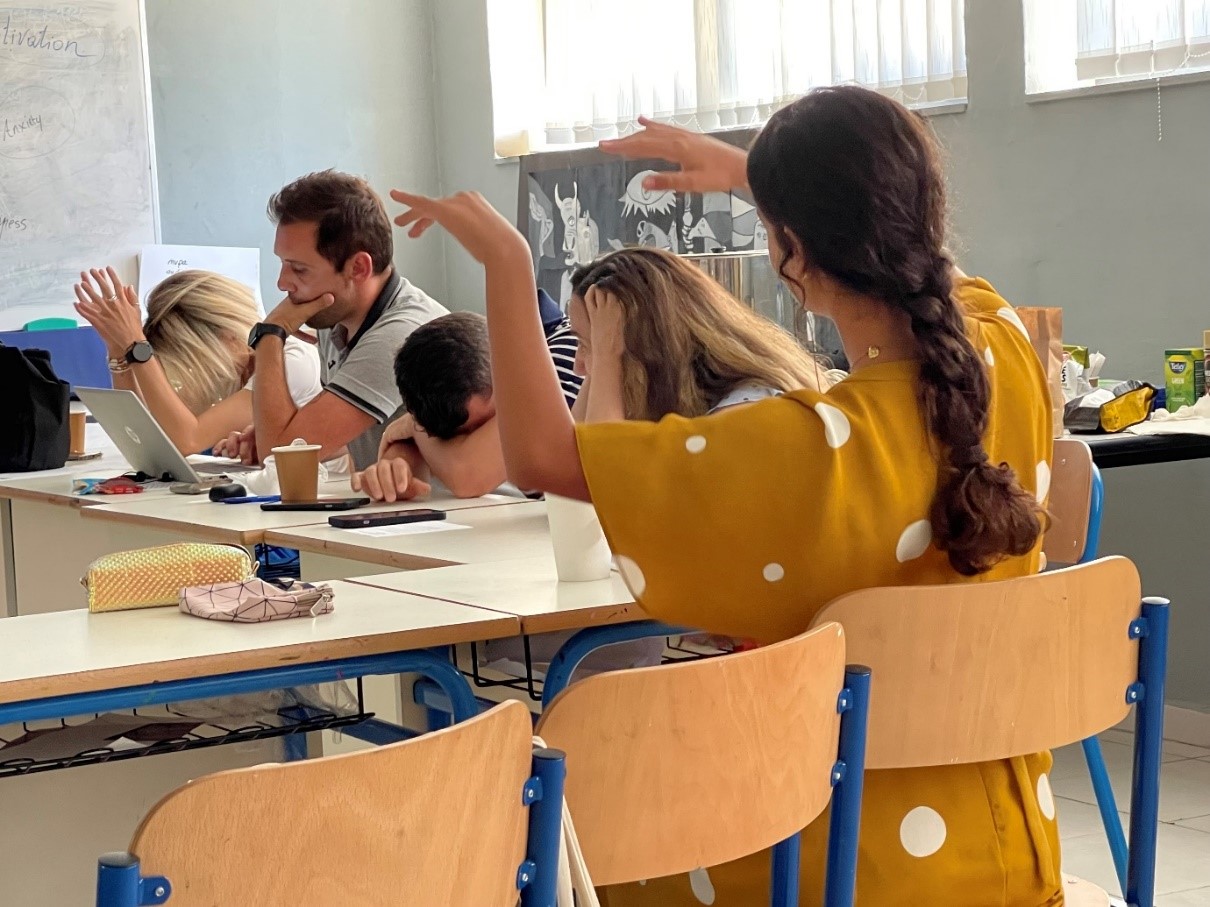
In-service teachers specialised in art, dance, drama and music education participate in role play as part of one of the micro teaching sessions held during the final session of Course 2: Course 2: The arts for inquiry, sustainability and active engagement.
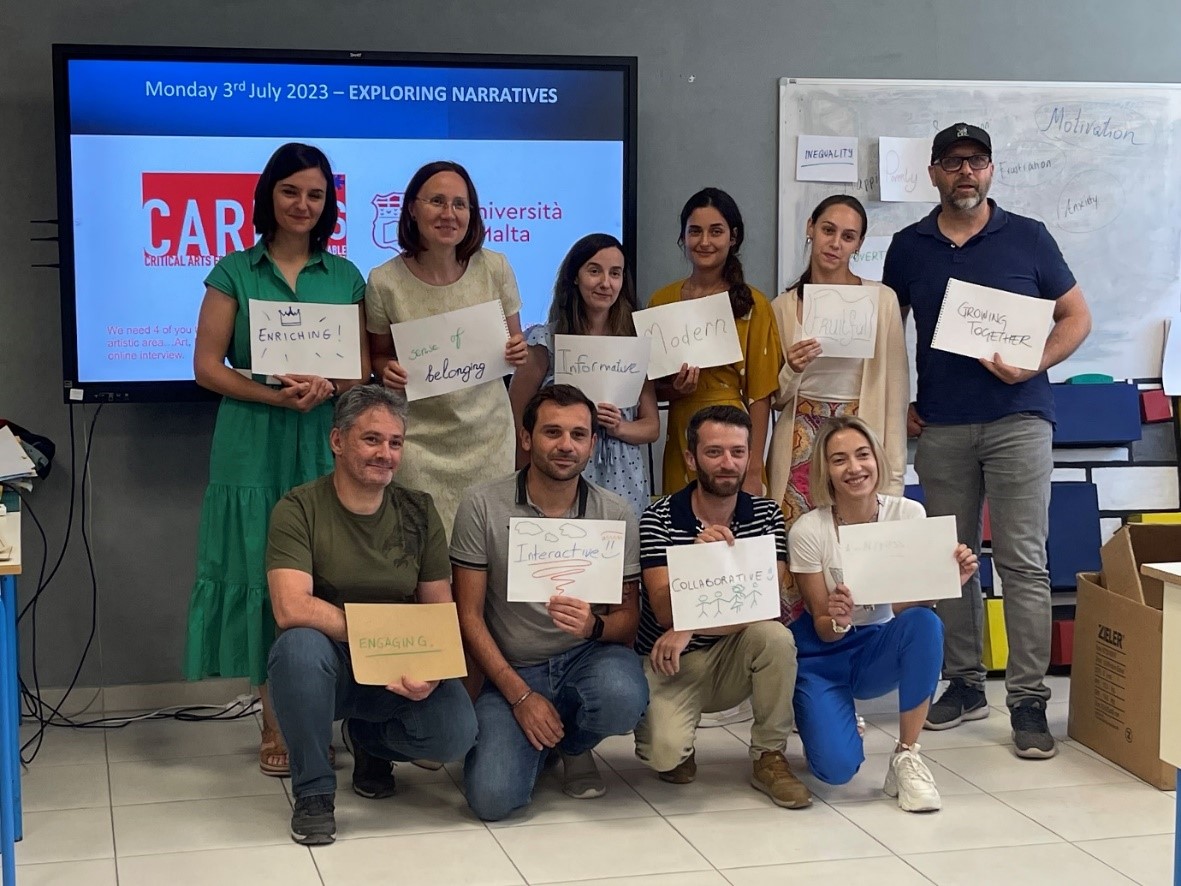
In-service teachers at the Malta Visual and Performing Arts school ‘exploring narratives’ during one of the sessions of Course 2: Course 2: The arts for inquiry, sustainability and active engagement organised by the University of Malta team.
Training offered by the University of Barcelona (UB), Spain
Critical ARts Education for Sustainable Societies (CARE/SS)
The University of Barcelona offered two training courses related to the CARE/ss project.
1. Hybrid course in Music and Technologies for postgraduate students enrolled in the Master’s degree in teachers’ training for Secondary Education.
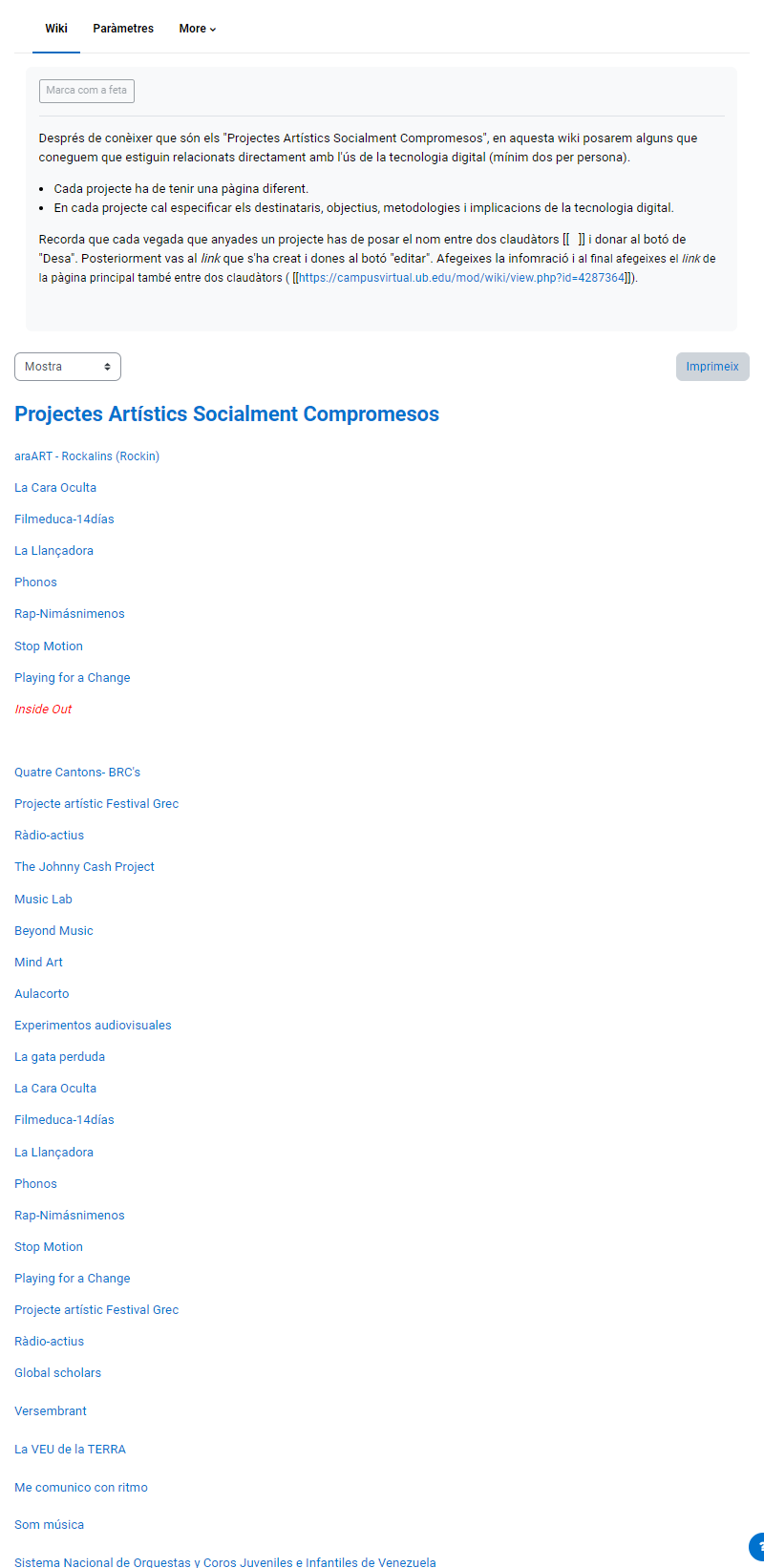 Figure 1. Screenshot of a collaborative Wiki. |
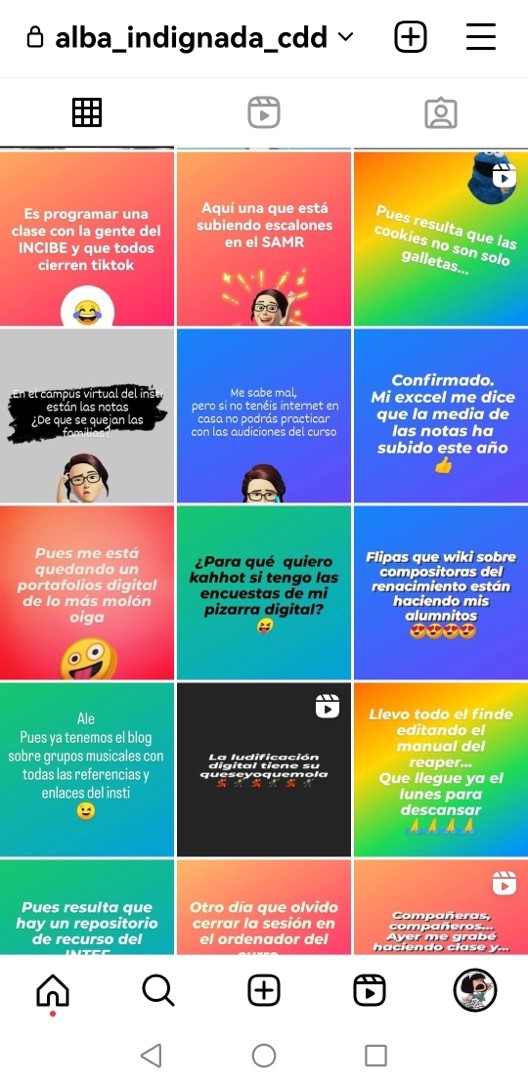 Figure 2. Screenshot of an ‘escape room’ on teaching digital competences. |
2. Hybrid training course at the Institute of Professional Development for in-service Primary teachers.
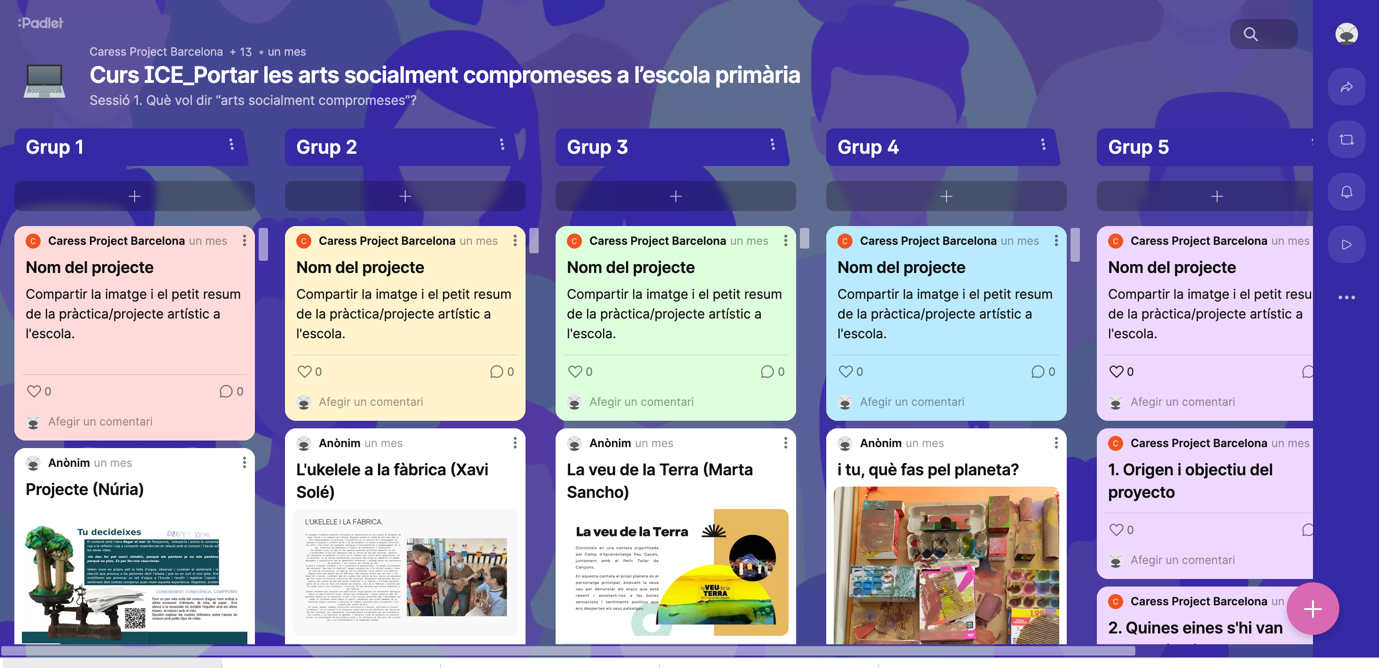
Figure 3. Padlet for sharing cases of socially engaged art education.
![Figure 4. Face-to-face session on July 23 at the CESIRE [Center of Pedagogical Resources for Supporting Educational Research and Innovation] in Barcelona. Image](/images/2023/10/02/b_f4.jpg)
